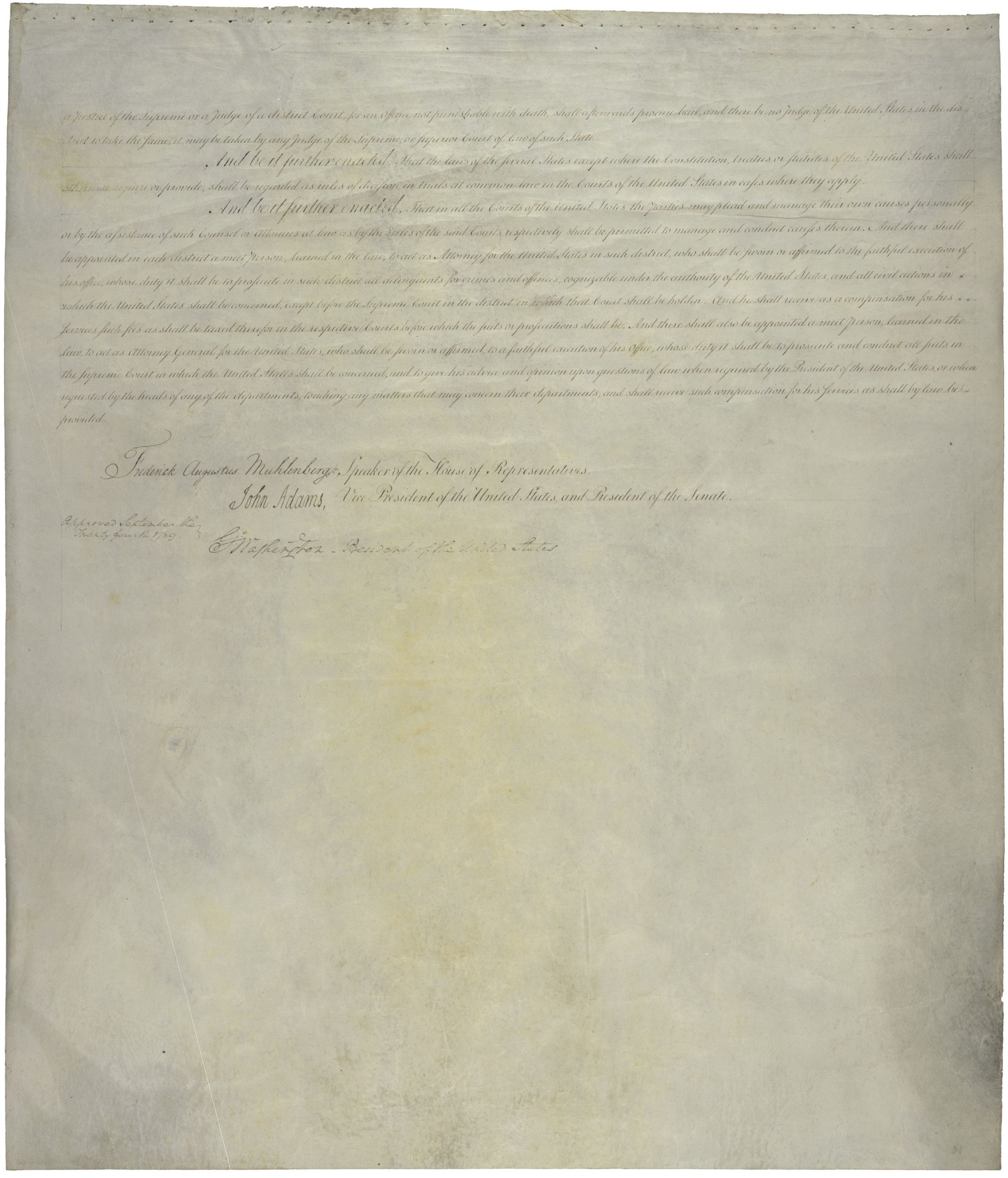Checks and Balances in Action
Seeing the Big Picture
All documents and text associated with this activity are printed below, followed by a worksheet for student responses.Introduction
When the Founders drafted the Constitution, they created a system where three branches would counter each other in an effort to ensure that no particular branch dominated the government.Match the document to the description of the correct "checks and balances."
Name:
Class:
Class:
Worksheet
Checks and Balances in Action
Seeing the Big Picture
Examine the documents and text included in this activity. Consider how each document or piece of text relates to each other and create matched pairs. Write the text or document number next to its match below. Write your conclusion response in the space provided.1
2
3
4
5
6
1
Activity Element
Legislative Check on the Executive
(Impeachment Power)
(Impeachment Power)
2
Activity Element
Legislative Check on the Judiciary
(Establishment of Lower Courts by Congress)
(Establishment of Lower Courts by Congress)
3
Activity Element

4
Activity Element
Legislative Check on the Executive
(Overriding a Veto)
(Overriding a Veto)
5
Activity Element
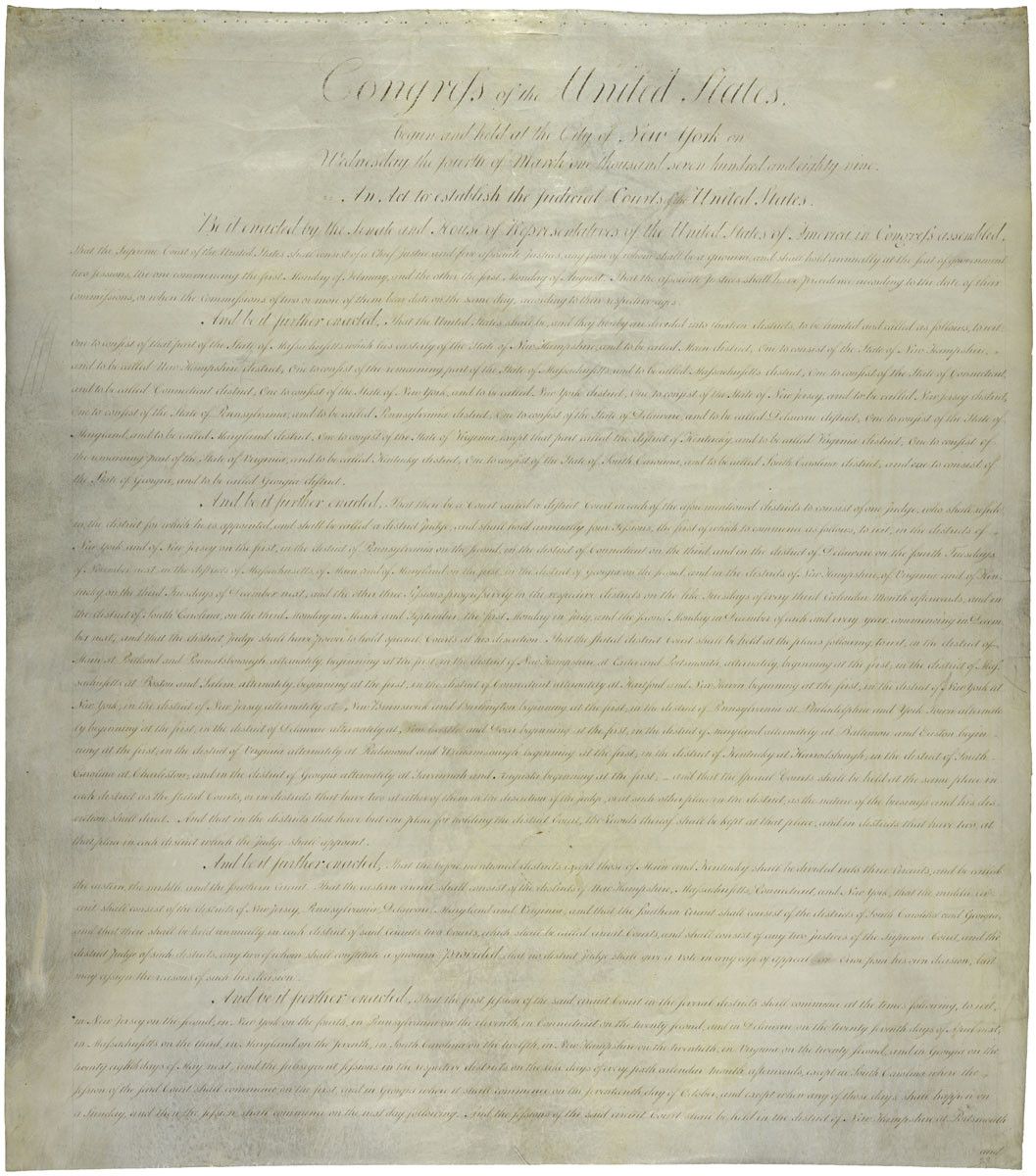
6
Activity Element
Executive Check on the Legislative
(Veto Power)
(Veto Power)
7
Activity Element
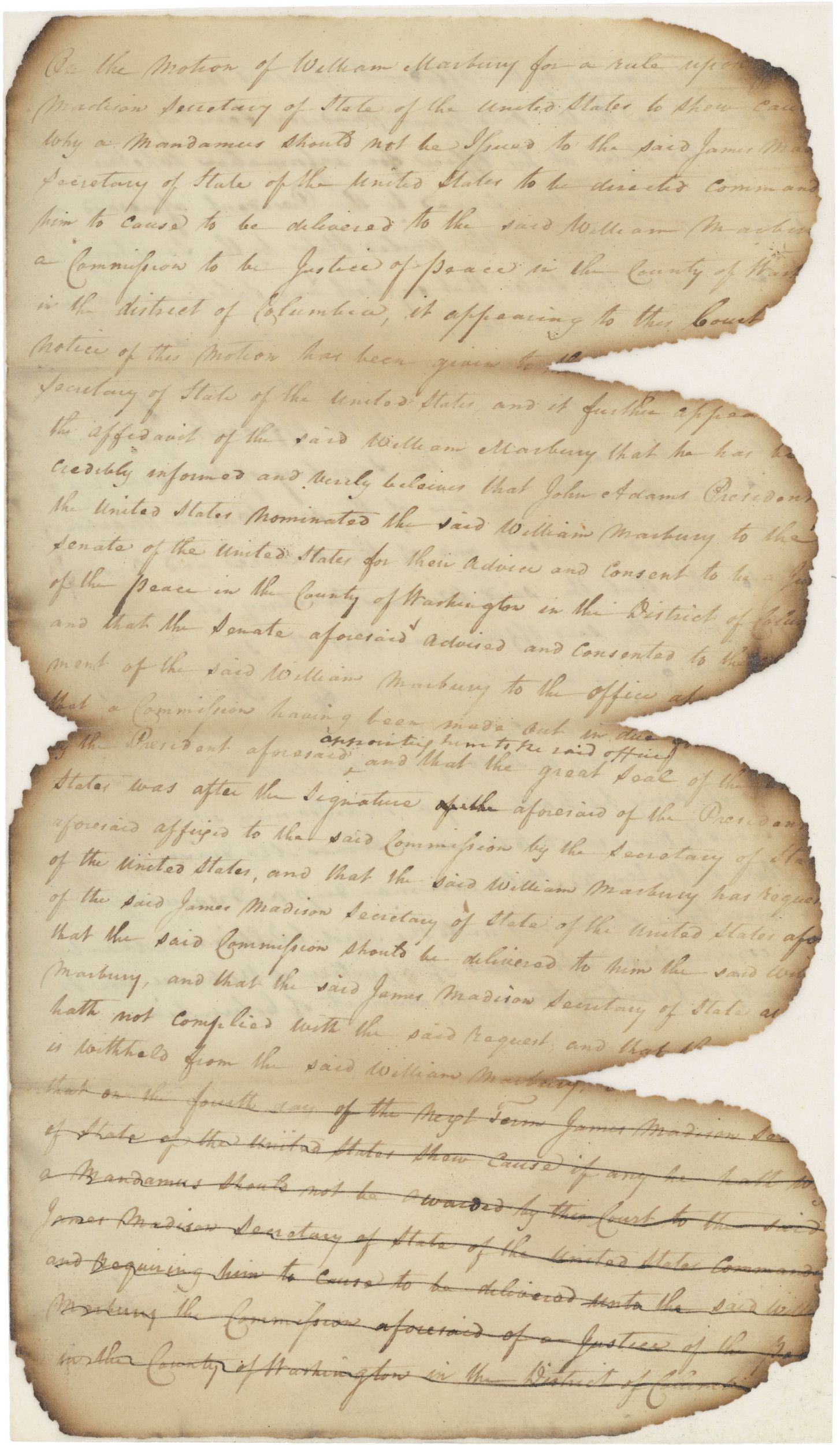
8
Activity Element
Legislative Check on the Executive
(Advise and Consent concerning Nominations for Supreme Court)
(Advise and Consent concerning Nominations for Supreme Court)
9
Activity Element
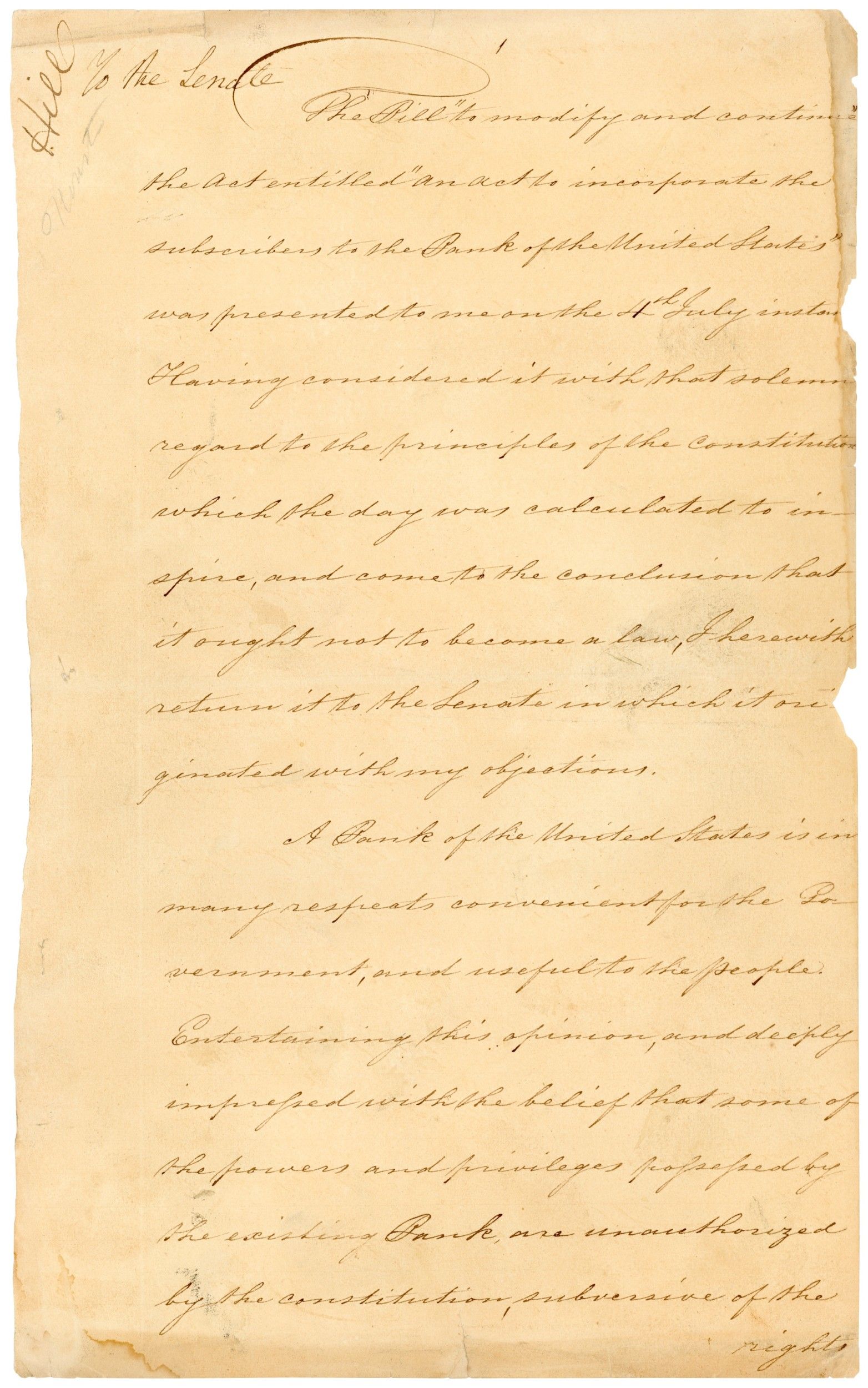
10
Activity Element
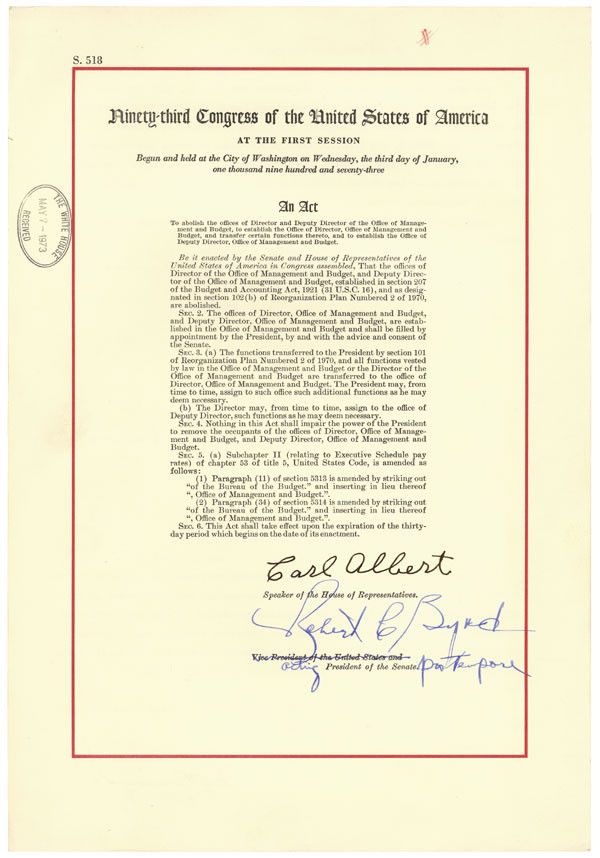
11
Activity Element
Judicial Check on the Legislative and Executive
(Declaring Law Unconstitutional through Judicial Review)
(Declaring Law Unconstitutional through Judicial Review)
12
Activity Element
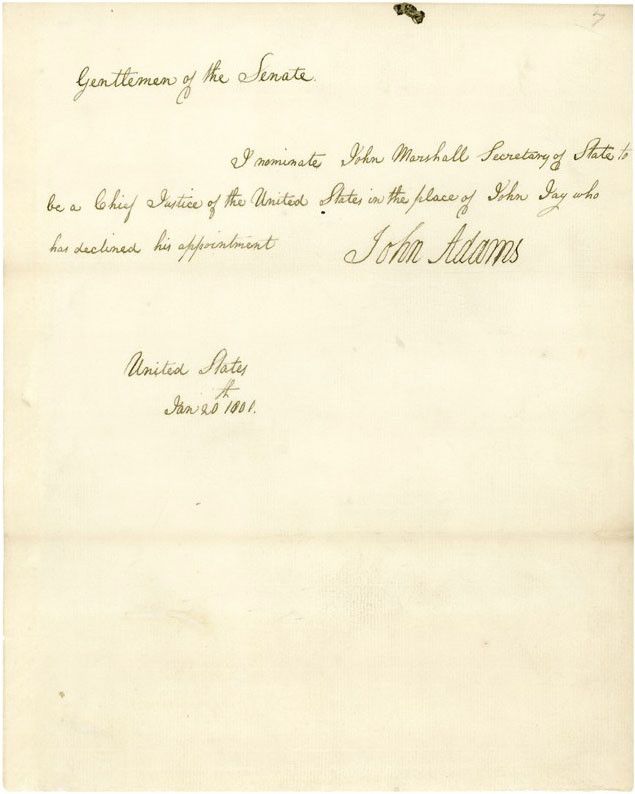
Culminating Document
Constitution of the United States
9/17/1787
Drafted in secret by delegates to the Constitutional Convention during the summer of 1787, this four-page document, signed on September 17, 1787, established the government of the United States.
The Federal Convention convened in the State House (Independence Hall) in Philadelphia on May 14, 1787, to revise the Articles of Confederation. Because the delegations from only two states were at first present, the members adjourned from day to day until a quorum of seven states was obtained on May 25. Through discussion and debate it became clear by mid-June that, rather than amend the existing Articles, the Convention would draft an entirely new frame of government.
All through the summer, in closed sessions, the delegates debated, and redrafted the articles of the new Constitution. Among the chief points at issue were how much power to allow the central government, how many representatives in Congress to allow each state, and how these representatives should be elected — directly by the people or by the state legislators. The work of many minds, the Constitution stands as a model of cooperative statesmanship and the art of compromise.
The Federal Convention convened in the State House (Independence Hall) in Philadelphia on May 14, 1787, to revise the Articles of Confederation. Because the delegations from only two states were at first present, the members adjourned from day to day until a quorum of seven states was obtained on May 25. Through discussion and debate it became clear by mid-June that, rather than amend the existing Articles, the Convention would draft an entirely new frame of government.
All through the summer, in closed sessions, the delegates debated, and redrafted the articles of the new Constitution. Among the chief points at issue were how much power to allow the central government, how many representatives in Congress to allow each state, and how these representatives should be elected — directly by the people or by the state legislators. The work of many minds, the Constitution stands as a model of cooperative statesmanship and the art of compromise.
Transcript
We the People of the United States, in Order to form a more perfect Union, establish Justice, insure domestic Tranquility, provide for the common defence, promote the general Welfare, and secure the Blessings of Liberty to ourselves and our Posterity, do ordain and establish this Constitution for the United States of America.Article. I.
Section. 1.
All legislative Powers herein granted shall be vested in a Congress of the United States, which shall consist of a Senate and House of Representatives.
Section. 2.
The House of Representatives shall be composed of Members chosen every second Year by the People of the several States, and the Electors in each State shall have the Qualifications requisite for Electors of the most numerous Branch of the State Legislature.
No Person shall be a Representative who shall not have attained to the Age of twenty five Years, and been seven Years a Citizen of the United States, and who shall not, when elected, be an Inhabitant of that State in which he shall be chosen.
Representatives and direct Taxes shall be apportioned among the several States which may be included within this Union, according to their respective Numbers, which shall be determined by adding to the whole Number of free Persons, including those bound to Service for a Term of Years, and excluding Indians not taxed, three fifths of all other Persons. The actual Enumeration shall be made within three Years after the first Meeting of the Congress of the United States, and within every subsequent Term of ten Years, in such Manner as they shall by Law direct. The Number of Representatives shall not exceed one for every thirty Thousand, but each State shall have at Least one Representative; and until such enumeration shall be made, the State of New Hampshire shall be entitled to chuse three, Massachusetts eight, Rhode-Island and Providence Plantations one, Connecticut five, New-York six, New Jersey four, Pennsylvania eight, Delaware one, Maryland six, Virginia ten, North Carolina five, South Carolina five, and Georgia three.
When vacancies happen in the Representation from any State, the Executive Authority thereof shall issue Writs of Election to fill such Vacancies.
The House of Representatives shall chuse their Speaker and other Officers; and shall have the sole Power of Impeachment.
Section. 3.
The Senate of the United States shall be composed of two Senators from each State, chosen by the Legislature thereof, for six Years; and each Senator shall have one Vote.
Immediately after they shall be assembled in Consequence of the first Election, they shall be divided as equally as may be into three Classes. The Seats of the Senators of the first Class shall be vacated at the Expiration of the second Year, of the second Class at the Expiration of the fourth Year, and of the third Class at the Expiration of the sixth Year, so that one third may be chosen every second Year; and if Vacancies happen by Resignation, or otherwise, during the Recess of the Legislature of any State, the Executive thereof may make temporary Appointments until the next Meeting of the Legislature, which shall then fill such Vacancies.
No Person shall be a Senator who shall not have attained to the Age of thirty Years, and been nine Years a Citizen of the United States, and who shall not, when elected, be an Inhabitant of that State for which he shall be chosen.
The Vice President of the United States shall be President of the Senate, but shall have no Vote, unless they be equally divided.
The Senate shall chuse their other Officers, and also a President pro tempore, in the Absence of the Vice President, or when he shall exercise the Office of President of the United States.
The Senate shall have the sole Power to try all Impeachments. When sitting for that Purpose, they shall be on Oath or Affirmation. When the President of the United States is tried, the Chief Justice shall preside: And no Person shall be convicted without the Concurrence of two thirds of the Members present.
Judgment in Cases of Impeachment shall not extend further than to removal from Office, and disqualification to hold and enjoy any Office of honor, Trust or Profit under the United States: but the Party convicted shall nevertheless be liable and subject to Indictment, Trial, Judgment and Punishment, according to Law.
Section. 4.
The Times, Places and Manner of holding Elections for Senators and Representatives, shall be prescribed in each State by the Legislature thereof; but the Congress may at any time by Law make or alter such Regulations, except as to the Places of chusing Senators.
The Congress shall assemble at least once in every Year, and such Meeting shall be on the first Monday in December, unless they shall by Law appoint a different Day.
Section. 5.
Each House shall be the Judge of the Elections, Returns and Qualifications of its own Members, and a Majority of each shall constitute a Quorum to do Business; but a smaller Number may adjourn from day to day, and may be authorized to compel the Attendance of absent Members, in such Manner, and under such Penalties as each House may provide.
Each House may determine the Rules of its Proceedings, punish its Members for disorderly Behaviour, and, with the Concurrence of two thirds, expel a Member.
Each House shall keep a Journal of its Proceedings, and from time to time publish the same, excepting such Parts as may in their Judgment require Secrecy; and the Yeas and Nays of the Members of either House on any question shall, at the Desire of one fifth of those Present, be entered on the Journal.
Neither House, during the Session of Congress, shall, without the Consent of the other, adjourn for more than three days, nor to any other Place than that in which the two Houses shall be sitting.
Section. 6.
The Senators and Representatives shall receive a Compensation for their Services, to be ascertained by Law, and paid out of the Treasury of the United States. They shall in all Cases, except Treason, Felony and Breach of the Peace, be privileged from Arrest during their Attendance at the Session of their respective Houses, and in going to and returning from the same; and for any Speech or Debate in either House, they shall not be questioned in any other Place.
No Senator or Representative shall, during the Time for which he was elected, be appointed to any civil Office under the Authority of the United States, which shall have been created, or the Emoluments whereof shall have been encreased during such time; and no Person holding any Office under the United States, shall be a Member of either House during his Continuance in Office.
Section. 7.
All Bills for raising Revenue shall originate in the House of Representatives; but the Senate may propose or concur with Amendments as on other Bills.
Every Bill which shall have passed the House of Representatives and the Senate, shall, before it become a Law, be presented to the President of the
United States; If he approve he shall sign it, but if not he shall return it, with his Objections to that House in which it shall have originated, who shall enter the Objections at large on their Journal, and proceed to reconsider it. If after such Reconsideration two thirds of that House shall agree to pass the Bill, it shall be sent, together with the Objections, to the other House, by which it shall likewise be reconsidered, and if approved by two thirds of that House, it shall become a Law. But in all such Cases the Votes of both Houses shall be determined by yeas and Nays, and the Names of the Persons voting for and against the Bill shall be entered on the Journal of each House respectively. If any Bill shall not be returned by the President within ten Days (Sundays excepted) after it shall have been presented to him, the Same shall be a Law, in like Manner as if he had signed it, unless the Congress by their Adjournment prevent its Return, in which Case it shall not be a Law.
Every Order, Resolution, or Vote to which the Concurrence of the Senate and House of Representatives may be necessary (except on a question of Adjournment) shall be presented to the President of the United States; and before the Same shall take Effect, shall be approved by him, or being disapproved by him, shall be repassed by two thirds of the Senate and House of Representatives, according to the Rules and Limitations prescribed in the Case of a Bill.
Section. 8.
The Congress shall have Power To lay and collect Taxes, Duties, Imposts and Excises, to pay the Debts and provide for the common Defence and general Welfare of the United States; but all Duties, Imposts and Excises shall be uniform throughout the United States;
To borrow Money on the credit of the United States;
To regulate Commerce with foreign Nations, and among the several States, and with the Indian Tribes;
To establish an uniform Rule of Naturalization, and uniform Laws on the subject of Bankruptcies throughout the United States;
To coin Money, regulate the Value thereof, and of foreign Coin, and fix the Standard of Weights and Measures;
To provide for the Punishment of counterfeiting the Securities and current Coin of the United States;
To establish Post Offices and post Roads;
To promote the Progress of Science and useful Arts, by securing for limited Times to Authors and Inventors the exclusive Right to their respective Writings and Discoveries;
To constitute Tribunals inferior to the supreme Court;
To define and punish Piracies and Felonies committed on the high Seas, and Offences against the Law of Nations;
To declare War, grant Letters of Marque and Reprisal, and make Rules concerning Captures on Land and Water;
To raise and support Armies, but no Appropriation of Money to that Use shall be for a longer Term than two Years;
To provide and maintain a Navy;
To make Rules for the Government and Regulation of the land and naval Forces;
To provide for calling forth the Militia to execute the Laws of the Union, suppress Insurrections and repel Invasions;
To provide for organizing, arming, and disciplining, the Militia, and for governing such Part of them as may be employed in the Service of the United States, reserving to the States respectively, the Appointment of the Officers, and the Authority of training the Militia according to the discipline prescribed by Congress;
To exercise exclusive Legislation in all Cases whatsoever, over such District (not exceeding ten Miles square) as may, by Cession of particular States, and the Acceptance of Congress, become the Seat of the Government of the United States, and to exercise like Authority over all Places purchased by the Consent of the Legislature of the State in which the Same shall be, for the Erection of Forts, Magazines, Arsenals, dock-Yards, and other needful Buildings;—And
To make all Laws which shall be necessary and proper for carrying into Execution the foregoing Powers, and all other Powers vested by this Constitution in the Government of the United States, or in any Department or Officer thereof.
Section. 9.
The Migration or Importation of such Persons as any of the States now existing shall think proper to admit, shall not be prohibited by the Congress prior to the Year one thousand eight hundred and eight, but a Tax or duty may be imposed on such Importation, not exceeding ten dollars for each Person.
The Privilege of the Writ of Habeas Corpus shall not be suspended, unless when in Cases of Rebellion or Invasion the public Safety may require it.
No Bill of Attainder or ex post facto Law shall be passed.
No Capitation, or other direct, Tax shall be laid, unless in Proportion to the Census or enumeration herein before directed to be taken.
No Tax or Duty shall be laid on Articles exported from any State.
No Preference shall be given by any Regulation of Commerce or Revenue to the Ports of one State over those of another: nor shall Vessels bound to, or from, one State, be obliged to enter, clear, or pay Duties in another.
No Money shall be drawn from the Treasury, but in Consequence of Appropriations made by Law; and a regular Statement and Account of the Receipts and Expenditures of all public Money shall be published from time to time.
No Title of Nobility shall be granted by the United States: And no Person holding any Office of Profit or Trust under them, shall, without the Consent of the Congress, accept of any present, Emolument, Office, or Title, of any kind whatever, from any King, Prince, or foreign State.
Section. 10.
No State shall enter into any Treaty, Alliance, or Confederation; grant Letters of Marque and Reprisal; coin Money; emit Bills of Credit; make any Thing but gold and silver Coin a Tender in Payment of Debts; pass any Bill of Attainder, ex post facto Law, or Law impairing the Obligation of Contracts, or grant any Title of Nobility.
No State shall, without the Consent of the Congress, lay any Imposts or Duties on Imports or Exports, except what may be absolutely necessary for executing it's inspection Laws: and the net Produce of all Duties and Imposts, laid by any State on Imports or Exports, shall be for the Use of the Treasury of the United States; and all such Laws shall be subject to the Revision and Controul of the Congress.
No State shall, without the Consent of Congress, lay any Duty of Tonnage, keep Troops, or Ships of War in time of Peace, enter into any Agreement or Compact with another State, or with a foreign Power, or engage in War, unless actually invaded, or in such imminent Danger as will not admit of delay.
Article. II.
Section. 1.
The executive Power shall be vested in a President of the United States of America. He shall hold his Office during the Term of four Years, and, together with the Vice President, chosen for the same Term, be elected, as follows
Each State shall appoint, in such Manner as the Legislature thereof may direct, a Number of Electors, equal to the whole Number of Senators and Representatives to which the State may be entitled in the Congress: but no Senator or Representative, or Person holding an Office of Trust or Profit under the United States, shall be appointed an Elector.
The Electors shall meet in their respective States, and vote by Ballot for two Persons, of whom one at least shall not be an Inhabitant of
the same State with themselves. And they shall make a List of all the Persons voted for, and of the Number of Votes for each; which List they shall sign and certify, and transmit sealed to the Seat of the Government of the United States, directed to the President of the Senate. The President of the Senate shall, in the Presence of the Senate and House of Representatives, open all the Certificates, and the Votes shall then be counted. The Person having the greatest Number of Votes shall be the President, if such Number be a Majority of the whole Number of Electors appointed; and if there be more than one who have such Majority, and have an equal Number of Votes, then the House of Representatives shall immediately chuse by Ballot one of them for President; and if no Person have a Majority, then from the five highest on the List the said House shall in like Manner chuse the President. But in chusing the President, the Votes shall be taken by States, the Representation from each State having one Vote; A quorum for this Purpose shall consist of a Member or Members from two thirds of the States, and a Majority of all the States shall be necessary to a Choice. In every Case, after the Choice of the President, the Person having the greatest Number of Votes of the Electors shall be the Vice President. But if there should remain two or more who have equal Votes, the Senate shall chuse from them by Ballot the Vice President.
The Congress may determine the Time of chusing the Electors, and the Day on which they shall give their Votes; which Day shall be the same throughout the United States.
No Person except a natural born Citizen, or a Citizen of the United States, at the time of the Adoption of this Constitution, shall be eligible to the Office of President; neither shall any Person be eligible to that Office who shall not have attained to the Age of thirty five Years, and been fourteen Years a Resident within the United States.
In Case of the Removal of the President from Office, or of his Death, Resignation, or Inability to discharge the Powers and Duties of the said Office, the Same shall devolve on the Vice President, and the Congress may by Law provide for the Case of Removal, Death, Resignation or Inability, both of the President and Vice President, declaring what Officer shall then act as President, and such Officer shall act accordingly, until the Disability be removed, or a President shall be elected.
The President shall, at stated Times, receive for his Services, a Compensation, which shall neither be encreased nor diminished during the Period for which he shall have been elected, and he shall not receive within that Period any other Emolument from the United States, or any of them.
Before he enter on the Execution of his Office, he shall take the following Oath or Affirmation:—"I do solemnly swear (or affirm) that I will faithfully execute the Office of President of the United States, and will to the best of my Ability, preserve, protect and defend the Constitution of the United States."
Section. 2.
The President shall be Commander in Chief of the Army and Navy of the United States, and of the Militia of the several States, when called into the actual Service of the United States; he may require the Opinion, in writing, of the principal Officer in each of the executive Departments, upon any Subject relating to the Duties of their respective Offices, and he shall have Power to grant Reprieves and Pardons for Offences against the United States, except in Cases of Impeachment.
He shall have Power, by and with the Advice and Consent of the Senate, to make Treaties, provided two thirds of the Senators present concur; and he shall nominate, and by and with the Advice and Consent of the Senate, shall appoint Ambassadors, other public Ministers and Consuls, Judges of the supreme Court, and all other Officers of the United States, whose Appointments are not herein otherwise provided for, and which shall be established by Law: but the Congress may by Law vest the Appointment of such inferior Officers, as they think proper, in the President alone, in the Courts of Law, or in the Heads of Departments.
The President shall have Power to fill up all Vacancies that may happen during the Recess of the Senate, by granting Commissions which shall expire at the End of their next Session.
Section. 3.
He shall from time to time give to the Congress Information of the State of the Union, and recommend to their Consideration such Measures as he shall judge necessary and expedient; he may, on extraordinary Occasions, convene both Houses, or either of them, and in Case of Disagreement between them, with Respect to the Time of Adjournment, he may adjourn them to such Time as he shall think proper; he shall receive Ambassadors and other public Ministers; he shall take Care that the Laws be faithfully executed, and shall Commission all the Officers of the United States.
Section. 4.
The President, Vice President and all civil Officers of the United States, shall be removed from Office on Impeachment for, and Conviction of, Treason, Bribery, or other high Crimes and Misdemeanors.
Article III.
Section. 1.
The judicial Power of the United States, shall be vested in one supreme Court, and in such inferior Courts as the Congress may from time to time ordain and establish. The Judges, both of the supreme and inferior Courts, shall hold their Offices during good Behaviour, and shall, at stated Times, receive for their Services, a Compensation, which shall not be diminished during their Continuance in Office.
Section. 2.
The judicial Power shall extend to all Cases, in Law and Equity, arising under this Constitution, the Laws of the United States, and Treaties made, or which shall be made, under their Authority;—to all Cases affecting Ambassadors, other public Ministers and Consuls;—to all Cases of admiralty and maritime Jurisdiction;—to Controversies to which the United States shall be a Party;—to Controversies between two or more States;— between a State and Citizens of another State,—between Citizens of different States,—between Citizens of the same State claiming Lands under Grants of different States, and between a State, or the Citizens thereof, and foreign States, Citizens or Subjects.
In all Cases affecting Ambassadors, other public Ministers and Consuls, and those in which a State shall be Party, the supreme Court shall have original Jurisdiction. In all the other Cases before mentioned, the supreme Court shall have appellate Jurisdiction, both as to Law and Fact, with such Exceptions, and under such Regulations as the Congress shall make.
The Trial of all Crimes, except in Cases of Impeachment, shall be by Jury; and such Trial shall be held in the State where the said Crimes shall have been committed; but when not committed within any State, the Trial shall be at such Place or Places as the Congress may by Law have directed.
Section. 3.
Treason against the United States, shall consist only in levying War against them, or in adhering to their Enemies, giving them Aid and Comfort. No Person shall be convicted of Treason unless on the Testimony of two Witnesses to the same overt Act, or on Confession in open Court.
The Congress shall have Power to declare the Punishment of Treason, but no Attainder of Treason shall work Corruption of Blood, or Forfeiture except during the Life of the Person attainted.
Article. IV.
Section. 1.
Full Faith and Credit shall be given in each State to the public Acts, Records, and judicial Proceedings of every other State. And the
Congress may by general Laws prescribe the Manner in which such Acts, Records and Proceedings shall be proved, and the Effect thereof.
Section. 2.
The Citizens of each State shall be entitled to all Privileges and Immunities of Citizens in the several States.
A Person charged in any State with Treason, Felony, or other Crime, who shall flee from Justice, and be found in another State, shall on Demand of the executive Authority of the State from which he fled, be delivered up, to be removed to the State having Jurisdiction of the Crime.
No Person held to Service or Labour in one State, under the Laws thereof, escaping into another, shall, in Consequence of any Law or Regulation therein, be discharged from such Service or Labour, but shall be delivered up on Claim of the Party to whom such Service or Labour may be due.
Section. 3.
New States may be admitted by the Congress into this Union; but no new State shall be formed or erected within the Jurisdiction of any other State; nor any State be formed by the Junction of two or more States, or Parts of States, without the Consent of the Legislatures of the States concerned as well as of the Congress.
The Congress shall have Power to dispose of and make all needful Rules and Regulations respecting the Territory or other Property belonging to the United States; and nothing in this Constitution shall be so construed as to Prejudice any Claims of the United States, or of any particular State.
Section. 4.
The United States shall guarantee to every State in this Union a Republican Form of Government, and shall protect each of them against Invasion; and on Application of the Legislature, or of the Executive (when the Legislature cannot be convened), against domestic Violence.
Article. V.
The Congress, whenever two thirds of both Houses shall deem it necessary, shall propose Amendments to this Constitution, or, on the Application of the Legislatures of two thirds of the several States, shall call a Convention for proposing Amendments, which, in either Case, shall be valid to all Intents and Purposes, as Part of this Constitution, when ratified by the Legislatures of three fourths of the several States, or by Conventions in three fourths thereof, as the one or the other Mode of Ratification may be proposed by the Congress; Provided that no Amendment which may be made prior to the Year One thousand eight hundred and eight shall in any Manner affect the first and fourth Clauses in the Ninth Section of the first Article; and that no State, without its Consent, shall be deprived of its equal Suffrage in the Senate.
Article. VI.
All Debts contracted and Engagements entered into, before the Adoption of this Constitution, shall be as valid against the United States under this Constitution, as under the Confederation.
This Constitution, and the Laws of the United States which shall be made in Pursuance thereof; and all Treaties made, or which shall be made, under the Authority of the United States, shall be the supreme Law of the Land; and the Judges in every State shall be bound thereby, any Thing in the Constitution or Laws of any State to the Contrary notwithstanding.
The Senators and Representatives before mentioned, and the Members of the several State Legislatures, and all executive and judicial Officers, both of the United States and of the several States, shall be bound by Oath or Affirmation, to support this Constitution; but no religious Test shall ever be required as a Qualification to any Office or public Trust under the United States.
Article. VII.
The Ratification of the Conventions of nine States, shall be sufficient for the Establishment of this Constitution between the States so ratifying the Same.
The Word, "the," being interlined between the seventh and eighth Lines of the first Page, The Word "Thirty" being partly written on an Erazure in the fifteenth Line of the first Page, The Words "is tried" being interlined between the thirty second and thirty third Lines of the first Page and the Word "the" being interlined between the forty third and forty fourth Lines of the second Page.
Attest William Jackson Secretary
done in Convention by the Unanimous Consent of the States present the Seventeenth Day of September in the Year of our Lord one thousand seven hundred and Eighty seven and of the Independance of the United States of America the Twelfth In witness whereof We have hereunto subscribed our Names,
G°. Washington
Presidt and deputy from Virginia
Delaware
Geo: Read
Gunning Bedford jun
John Dickinson
Richard Bassett
Jaco: Broom
Maryland
James McHenry
Dan of St Thos. Jenifer
Danl. Carroll
Virginia
John Blair
James Madison Jr.
North Carolina
Wm. Blount
Richd. Dobbs Spaight
Hu Williamson
South Carolina
J. Rutledge
Charles Cotesworth Pinckney
Charles Pinckney
Pierce Butler
Georgia
William Few
Abr Baldwin
New Hampshire
John Langdon
Nicholas Gilman
Massachusetts
Nathaniel Gorham
Rufus King
Connecticut
Wm. Saml. Johnson
Roger Sherman
New York
Alexander Hamilton
New Jersey
Wil: Livingston
David Brearley
Wm. Paterson
Jona: Dayton
Pensylvania
B Franklin
Thomas Mifflin
Robt. Morris
Geo. Clymer
Thos. FitzSimons
Jared Ingersoll
James Wilson
Gouv Morris
This primary source comes from the General Records of the United States Government.
National Archives Identifier: 1667751
Full Citation: Constitution of the United States; 9/17/1787; The Constitution of the United States, 9/17/1787 - 9/17/1787; General Records of the United States Government, ; National Archives Building,Washington, DC. [Online Version, https://docsteach.org/documents/document/constitution, April 26, 2024]Constitution of the United States
Page 1
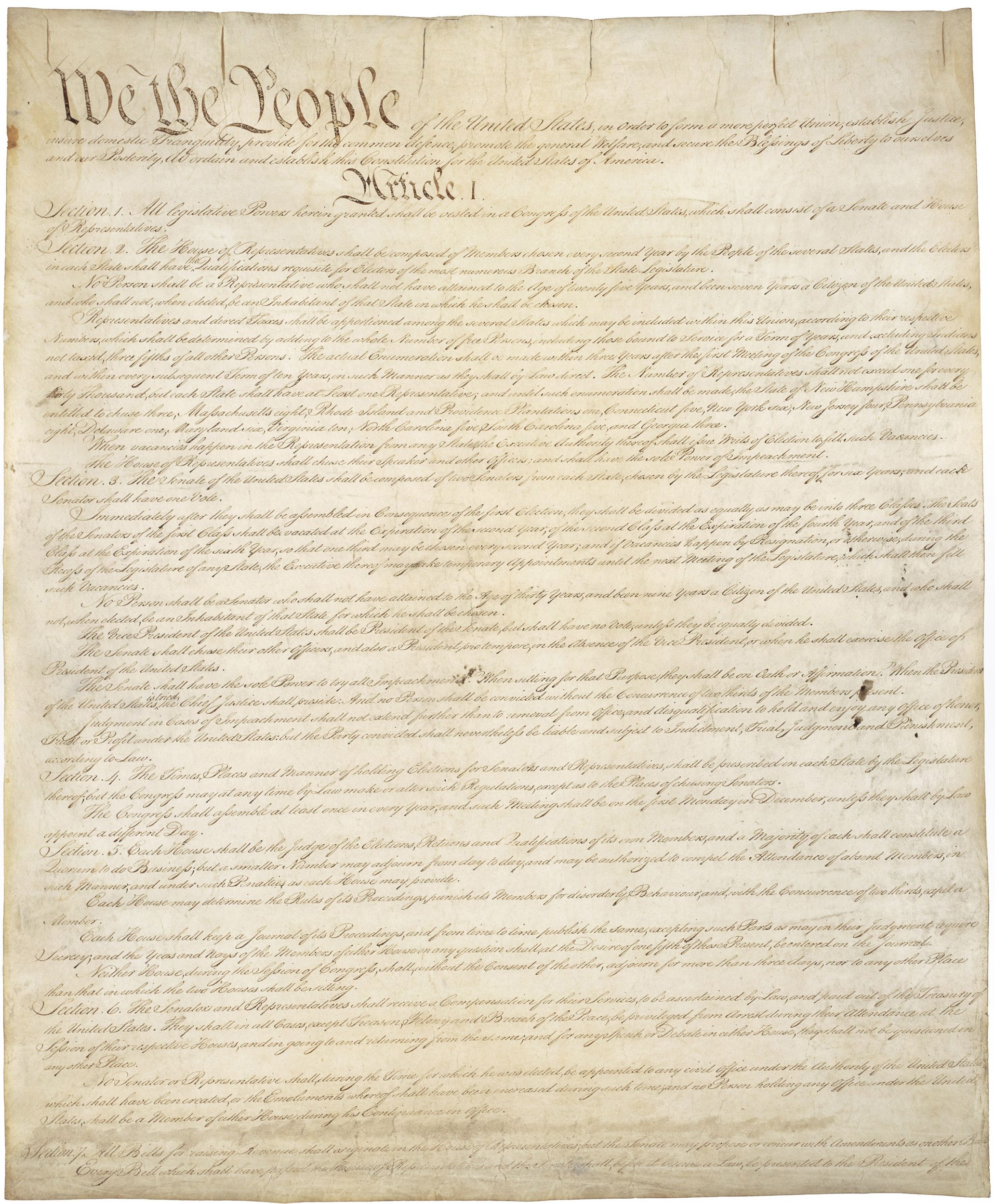
Constitution of the United States
Page 2
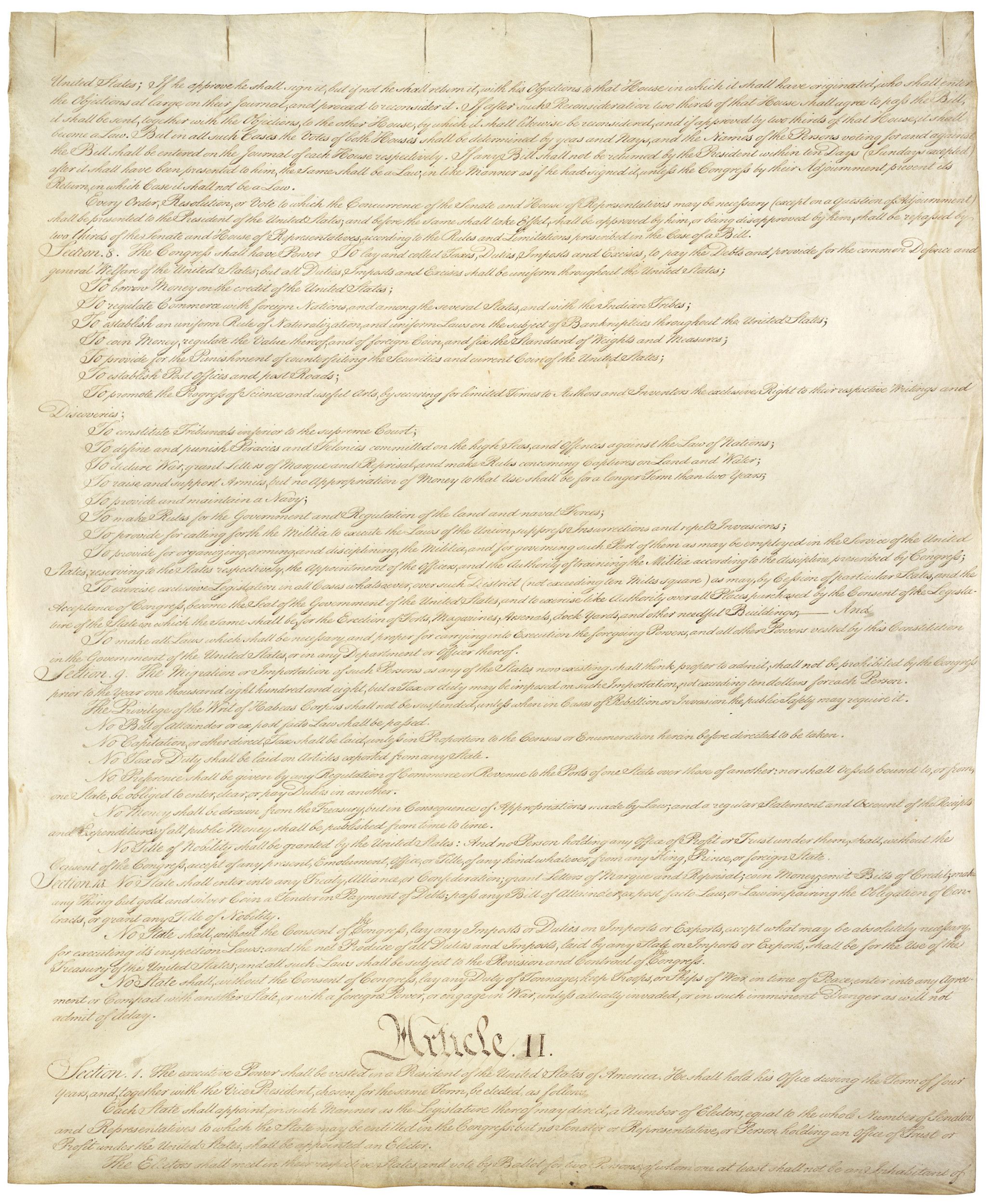
Constitution of the United States
Page 3
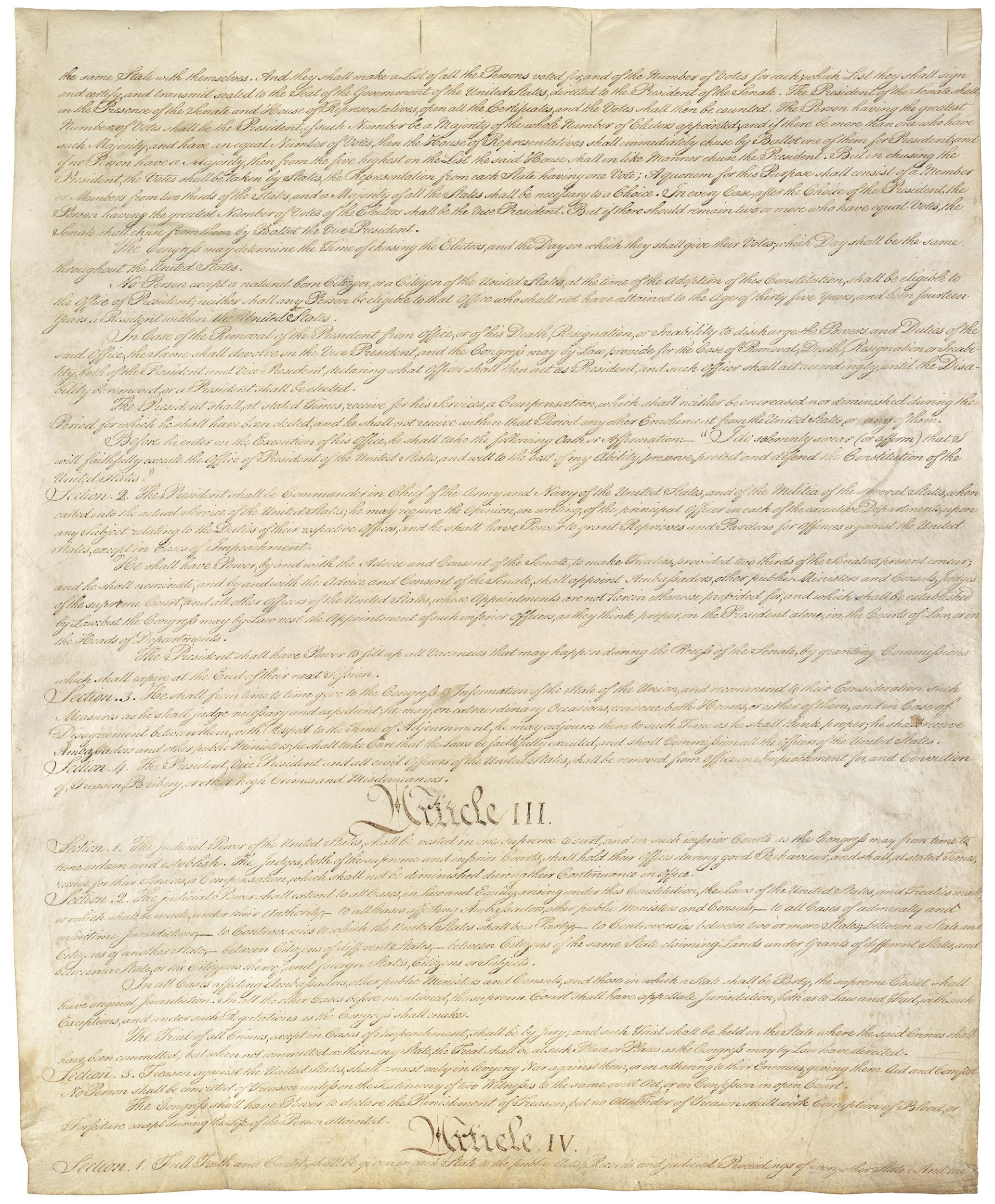
Constitution of the United States
Page 4
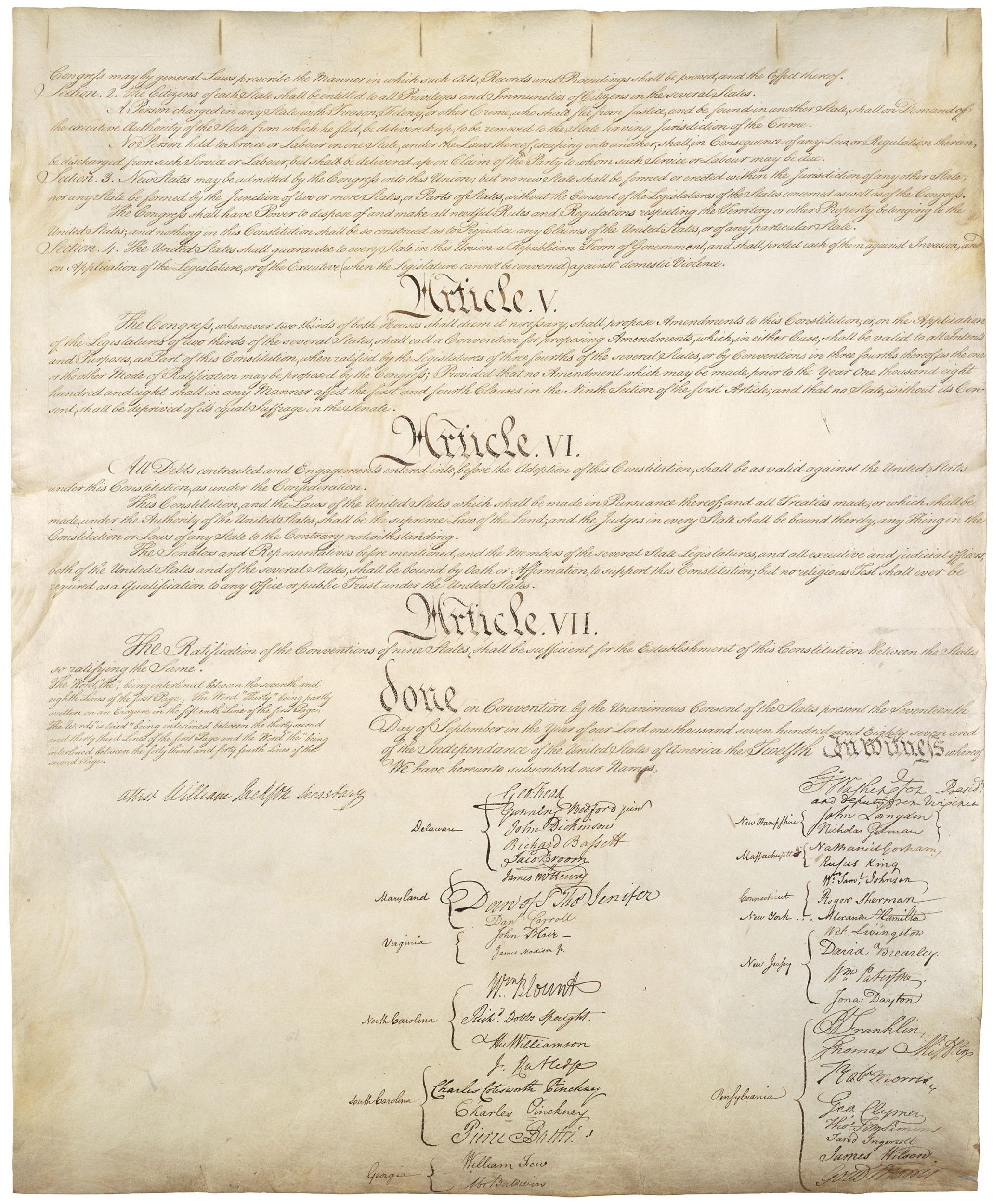
Conclusion
Checks and Balances in Action
Seeing the Big Picture
Based on the documents included in this activity, which branch has the most powerful check on the other branches? Explain.Your Response
Document
Roll call votes relating to the impeachment of President Andrew Johnson on Articles II, III, and XI
5/26/1868
This primary source comes from the Records of the U.S. Senate.
National Archives Identifier: 306275
Full Citation: Roll call votes relating to the impeachment of President Andrew Johnson on Articles II, III, and XI; 5/26/1868; Records of the U.S. Senate, . [Online Version, https://docsteach.org/documents/document/roll-call-votes-relating-to-the-impeachment-of-president-andrew-johnson-on-articles-ii-iii-and-xi, April 26, 2024]Roll call votes relating to the impeachment of President Andrew Johnson on Articles II, III, and XI
Page 1

Roll call votes relating to the impeachment of President Andrew Johnson on Articles II, III, and XI
Page 2

Roll call votes relating to the impeachment of President Andrew Johnson on Articles II, III, and XI
Page 3
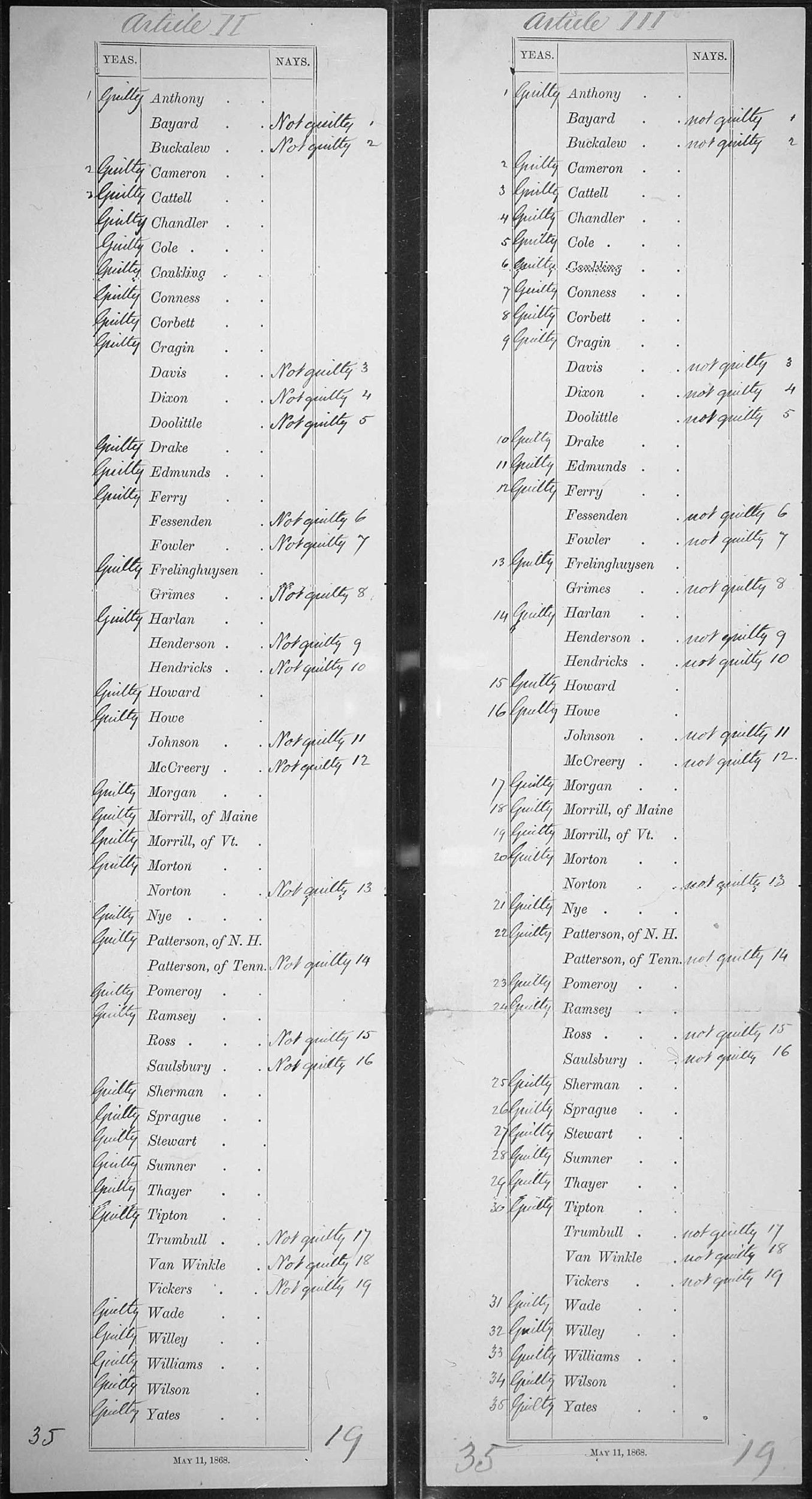
Roll call votes relating to the impeachment of President Andrew Johnson on Articles II, III, and XI
Page 4

Document
Selection from President Andrew Jackson's Veto of the Bank Recharter Bill
7/10/1832
This primary source comes from the Records of the U.S. Senate.
National Archives Identifier: 306427
Full Citation: Selection from President Andrew Jackson's Veto of the Bank Recharter Bill; 7/10/1832; Records of the U.S. Senate, . [Online Version, https://docsteach.org/documents/document/selection-from-president-andrew-jacksons-veto-of-the-bank-recharter-bill, April 26, 2024]Selection from President Andrew Jackson's Veto of the Bank Recharter Bill
Page 1
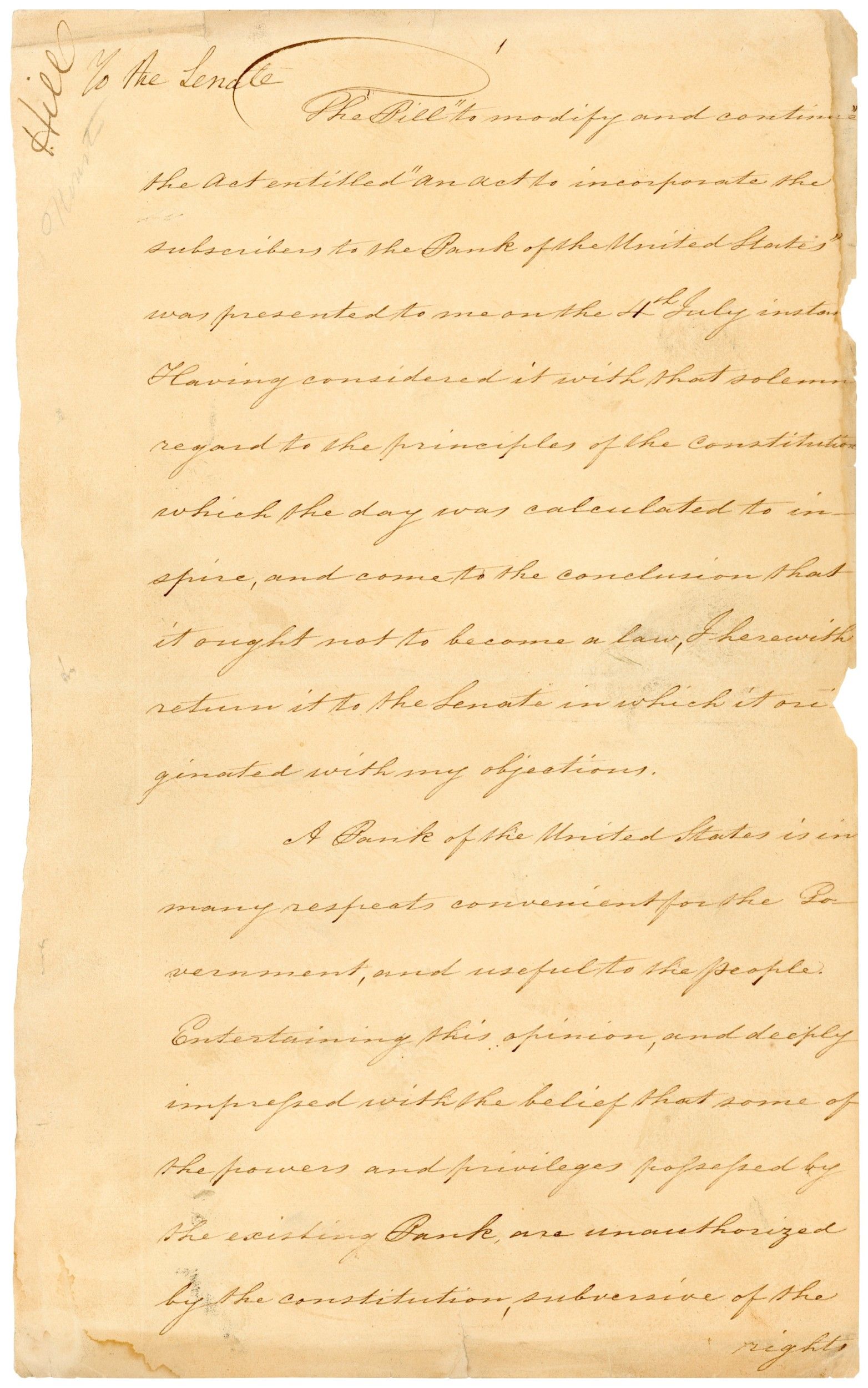
Selection from President Andrew Jackson's Veto of the Bank Recharter Bill
Page 2
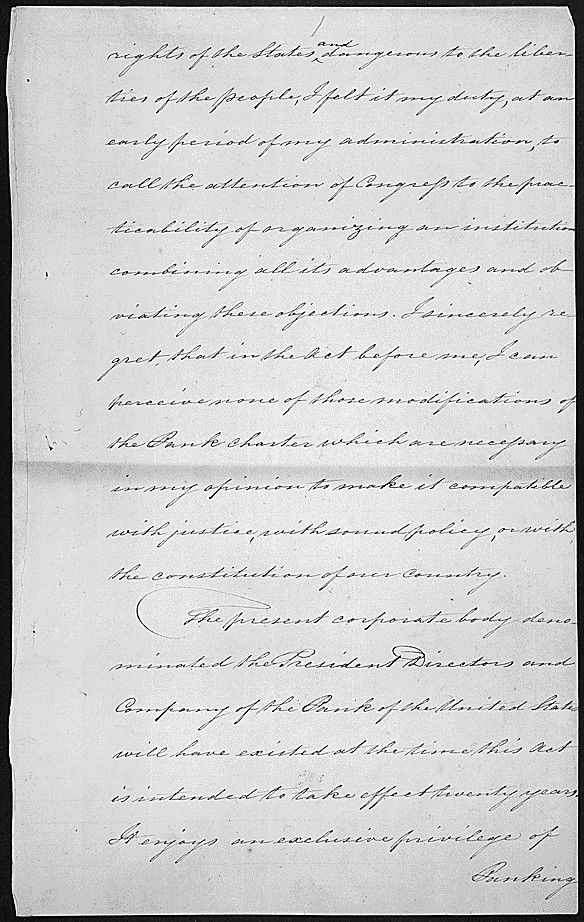
Selection from President Andrew Jackson's Veto of the Bank Recharter Bill
Page 4
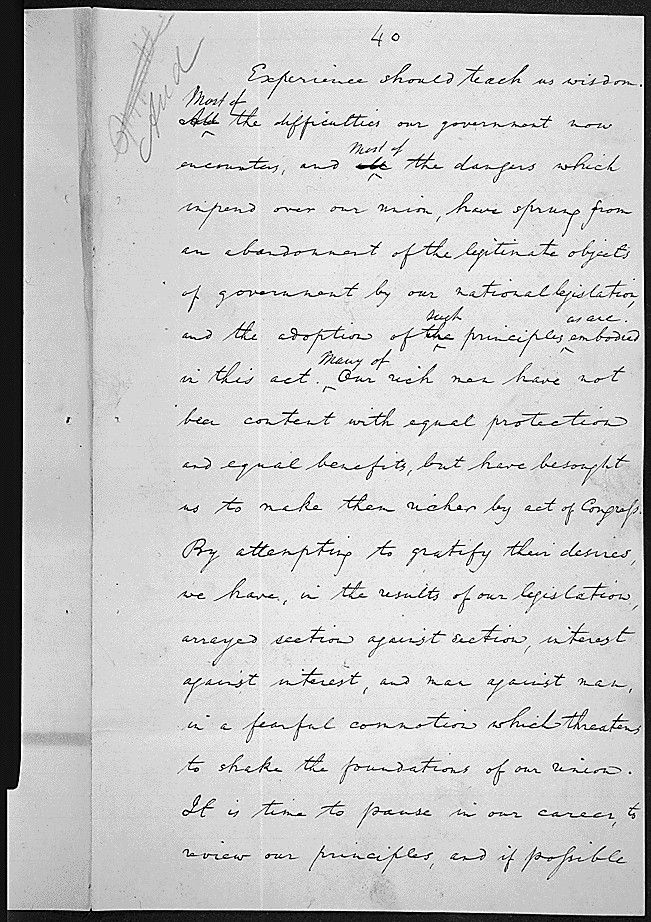
Selection from President Andrew Jackson's Veto of the Bank Recharter Bill
Page 5
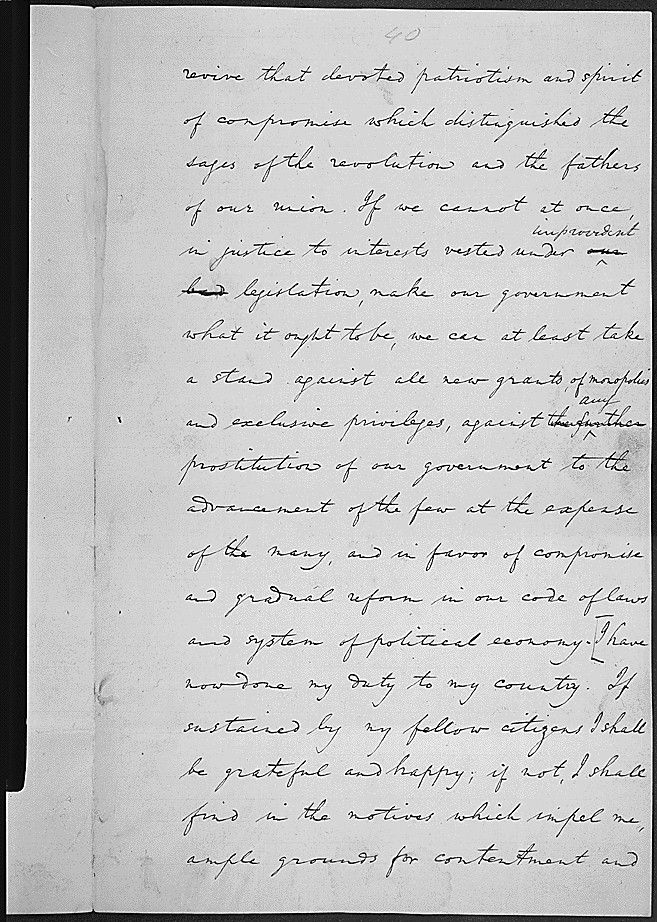
Selection from President Andrew Jackson's Veto of the Bank Recharter Bill
Page 6
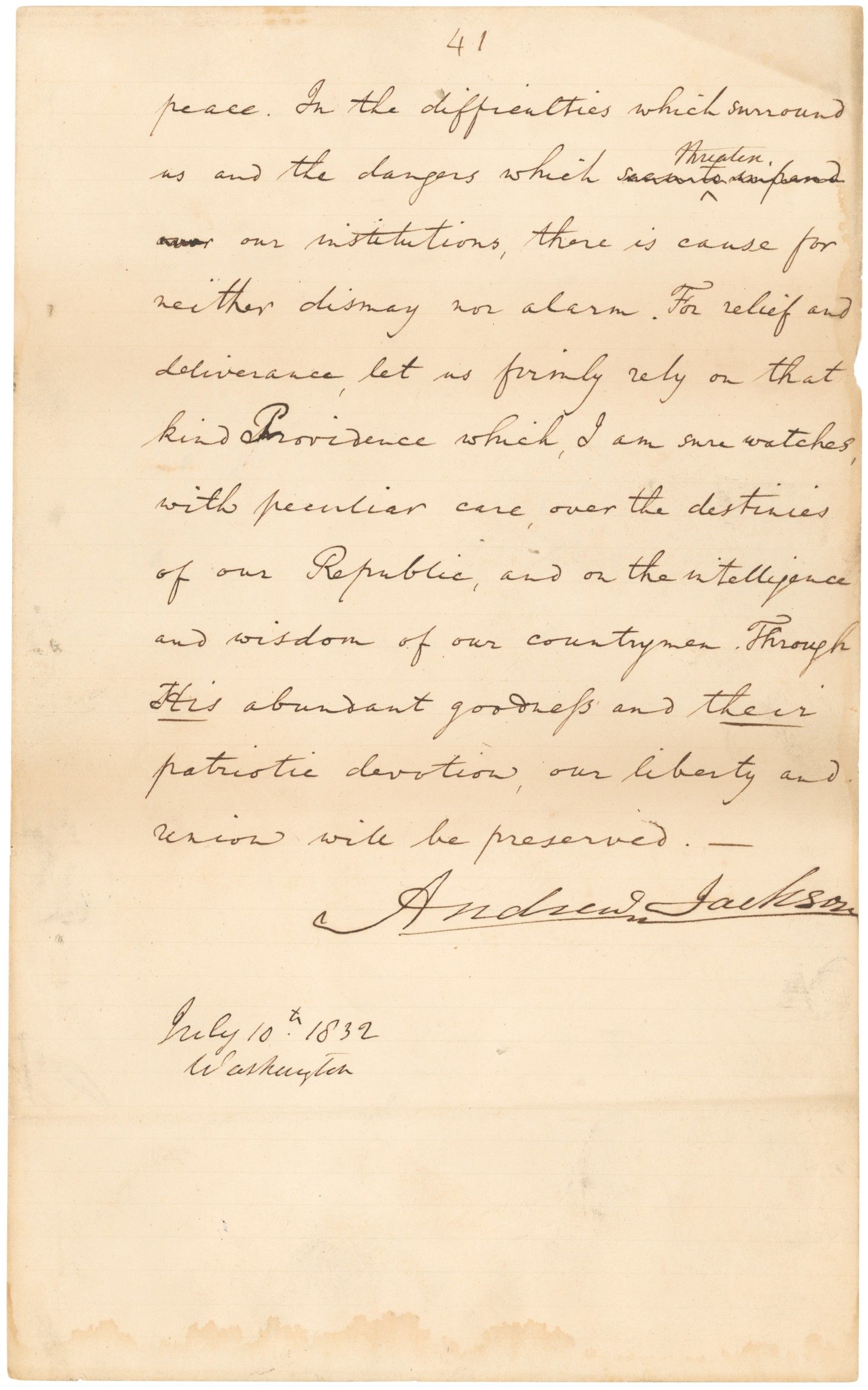
Selection from President Andrew Jackson's Veto of the Bank Recharter Bill
Page 7
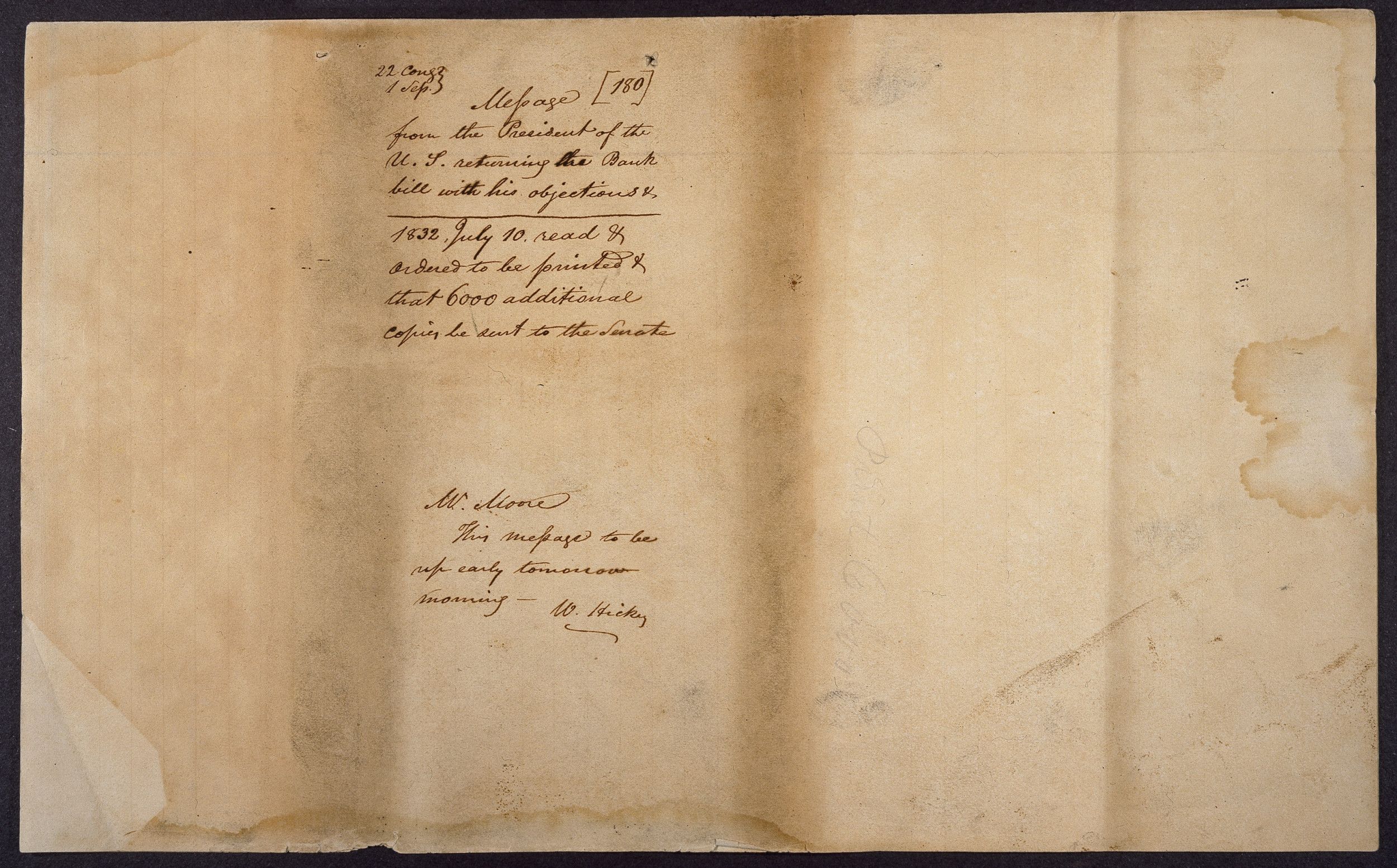
Selection from President Andrew Jackson's Veto of the Bank Recharter Bill
Page 3
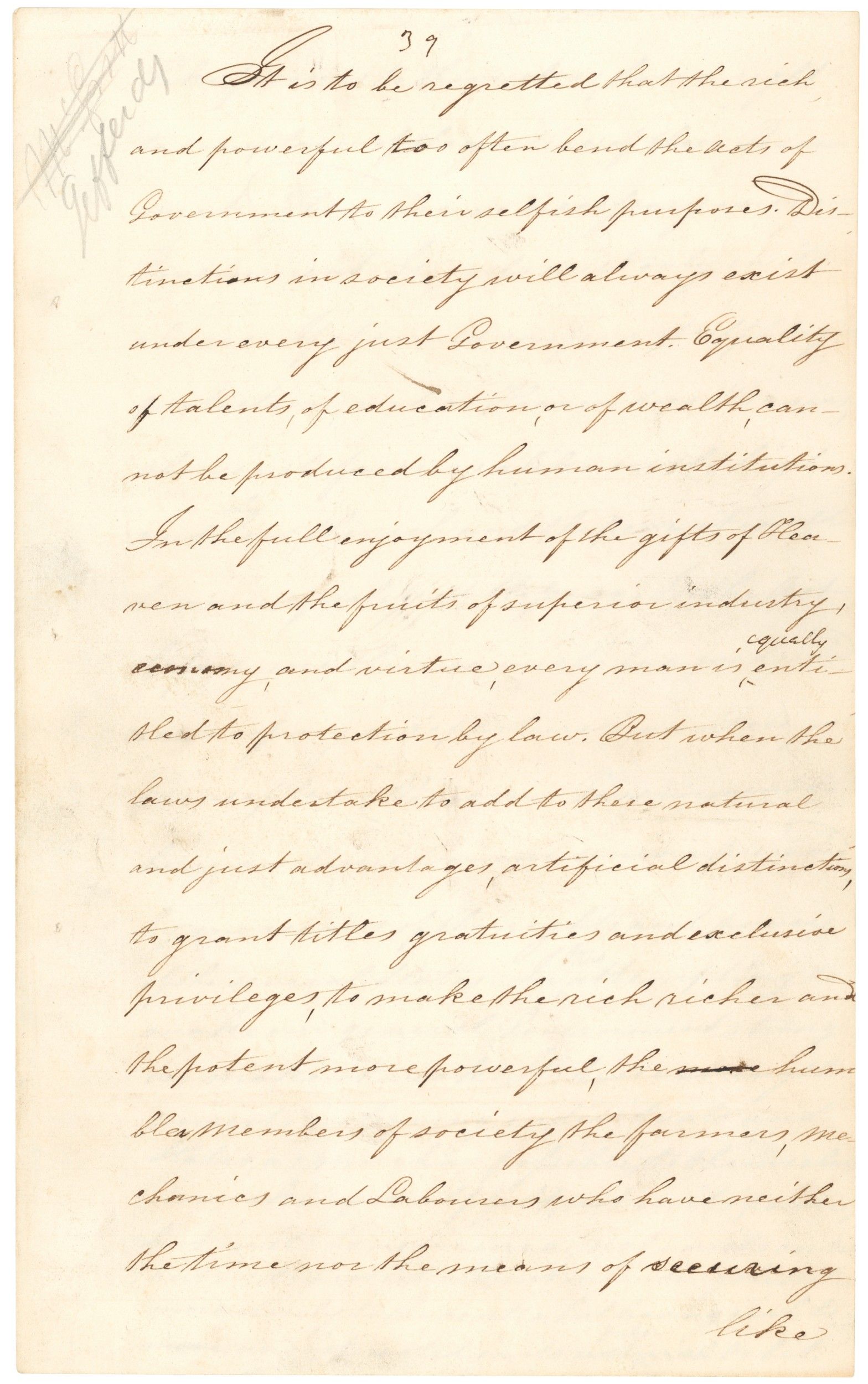
Document
Draft of Motion Rule for Marbury v. Madison
1803
Marbury v. Madison established the idea of judicial review, the ability of the Supreme Court to determine the constitutionality of the actions of the other two branches of government — an important addition to the system of “checks and balances” created to prevent any one branch of the Federal Government from becoming too powerful. The Supreme Court is the final authority on the meaning of the Constitution. Overturning its decisions often requires an amendment to the Constitution or a revision of Federal law.
In March 1801, in the final days of his administration, President John Adams appointed William Marbury as Justice of the Peace in the District of Columbia. Incoming Secretary of State, James Madison (under new President Thomas Jefferson), refused to deliver Marbury’s commission. Marbury petitioned the Supreme Court for a "writ of mandamus" (a command to a lower court or person to perform a public duty) requiring Madison to show cause as to why he should not receive his commission.
The Supreme Court ruled that it could not issue the mandamus. It decided that Section 13 of the Judiciary Act of 1789, which would have given the Court the ability to do so, was unconstitutional. Chief Justice John Marshall said “A Law repugnant to the Constitution is void.”
With these words, the Supreme Court for the first time declared unconstitutional a law passed by Congress and signed by the President. Nothing in the Constitution gave the Court this specific power. Marshall, however, believed that the Supreme Court should have a role equal to those of the other two branches of government.
The writers of the Constitution had given the executive and legislative branches powers that would limit each other as well as the judiciary branch. The Constitution gave Congress the power to impeach and remove officials, including judges or the President himself. The President was given the veto power to restrain Congress and the authority to appoint members of the Supreme Court with the advice and consent of the Senate. In this intricate system, the role of the Supreme Court had not been defined. It therefore fell to a strong Chief Justice like Marshall to complete the triangular structure of checks and balances by establishing the principle of judicial review.
Although no other law was declared unconstitutional until the Dred Scott decision of 1857, the role of the Supreme Court to invalidate Federal and state laws that are contrary to the Constitution has never been seriously challenged.
This document shows damage from the 1898 fire in the Capitol Building.
In March 1801, in the final days of his administration, President John Adams appointed William Marbury as Justice of the Peace in the District of Columbia. Incoming Secretary of State, James Madison (under new President Thomas Jefferson), refused to deliver Marbury’s commission. Marbury petitioned the Supreme Court for a "writ of mandamus" (a command to a lower court or person to perform a public duty) requiring Madison to show cause as to why he should not receive his commission.
The Supreme Court ruled that it could not issue the mandamus. It decided that Section 13 of the Judiciary Act of 1789, which would have given the Court the ability to do so, was unconstitutional. Chief Justice John Marshall said “A Law repugnant to the Constitution is void.”
With these words, the Supreme Court for the first time declared unconstitutional a law passed by Congress and signed by the President. Nothing in the Constitution gave the Court this specific power. Marshall, however, believed that the Supreme Court should have a role equal to those of the other two branches of government.
The writers of the Constitution had given the executive and legislative branches powers that would limit each other as well as the judiciary branch. The Constitution gave Congress the power to impeach and remove officials, including judges or the President himself. The President was given the veto power to restrain Congress and the authority to appoint members of the Supreme Court with the advice and consent of the Senate. In this intricate system, the role of the Supreme Court had not been defined. It therefore fell to a strong Chief Justice like Marshall to complete the triangular structure of checks and balances by establishing the principle of judicial review.
Although no other law was declared unconstitutional until the Dred Scott decision of 1857, the role of the Supreme Court to invalidate Federal and state laws that are contrary to the Constitution has never been seriously challenged.
This document shows damage from the 1898 fire in the Capitol Building.
Transcript
Chief Justice Marshall delivered the opinion of the Court.At the last term on the affidavits then read and filed with the clerk, a rule was granted in this case, requiring the Secretary of State to show cause why a mandamus should not issue, directing him to deliver to William Marbury his commission as a justice of the peace for the county of Washington, in the district of Columbia.
No cause has been shown, and the present motion is for a mandamus. The peculiar delicacy of this case, the novelty of some of its circumstances, and the real difficulty attending the points which occur in it, require a complete exposition of the principles on which the opinion to be given by the court is founded. . . .
In the order in which the court has viewed this subject, the following questions have been considered and decided:
1st. Has the applicant a right to the commission he demands?
2d. If he has a right, and that right has been violated, do the laws of his country afford him a remedy?
3d. If they do afford him a remedy, is it a mandamus issuing from this court?
The first object of inquiry is -- 1st. Has the applicant a right to the commission he demands? . . .
It [is] decidedly the opinion of the court, that when a commission has been signed by the president, the appointment is made; and that the commission is complete, when the seal of the United States has been affixed to it by the secretary of state. . . .
To withhold his commission, therefore, is an act deemed by the court not warranted by law, but violative of a vested legal right.
This brings us to the second inquiry; which is 2dly. If he has a right, and that right has been violated, do the laws of his country afford him a remedy?
The very essence of civil liberty certainly consists in the right of every individual to claim the protection of the laws, whenever he receives an injury. One of the first duties of government is to afford that protection. [The] government of the United States has been emphatically termed a government of laws, and not of men. It will certainly cease to deserve this high appellation, if the laws furnish no remedy for the violation of a vested legal right. . . .
By the constitution of the United States, the President is invested with certain important political powers, in the exercise of which he is to use his own discretion, and is accountable only to his country in his political character, and to his own conscience. To aid him in the performance of these duties, he is authorized to appoint certain officers, who act by his authority and in conformity with his orders.
In such cases, their acts are his acts; and whatever opinion may be entertained of the manner in which executive discretion may be used, still there exists, and can exist, no power to control that discretion. The subjects are political. They respect the nation, not individual rights, and being entrusted to the executive, the decision of the executive is conclusive. . . .
But when the legislature proceeds to impose on that officer other duties; when he is directed peremptorily to perform certain acts; when the rights of individuals are dependent on the performance of those acts; he is so far the officer of the law; is amenable to the laws for his conduct; and cannot at his discretion sport away the vested rights of others.
The conclusion from this reasoning is, that where the heads of departments are the political or confidential agents of the executive, merely to execute the will of the President, or rather to act in cases in which the executive possesses a constitutional or legal discretion, nothing can be more perfectly clear than that their acts are only politically examinable. But where a specific duty is assigned by law, and individual rights depend upon the performance of that duty, it seems equally clear, that the individual who considers himself injured, has a right to resort to the laws of his country for a remedy. . . .
It is, then, the opinion of the Court [that Marbury has a] right to the commission; a refusal to deliver which is a plain violation of that right, for which the laws of his country afford him a remedy.
It remains to be enquired whether,
3dly. He is entitled to the remedy for which he applies. This depends on -- 1st. The nature of the writ applied for, and,
2dly. The power of this court.
1st. The nature of the writ. . . .
This, then, is a plain case for a mandamus, either to deliver the commission, or a copy of it from the record; and it only remains to be enquired,
Whether it can issue from this court.
The act to establish the judicial courts of the United States authorizes the Supreme Court "to issue writs of mandamus in cases warranted by the principles and usages of law, to any courts appointed, or persons holding office, under the authority of the United States."
The Secretary of State, being a person holding an office under the authority of the United States, is precisely within the letter of the description; and if this court is not authorized to issue a writ of mandamus to such an officer, it must be because the law is unconstitutional, and therefore incapable of conferring the authority, and assigning the duties which its words purport to confer and assign.
The constitution vests the whole judicial power of the United States in one Supreme Court, and such inferior courts as congress shall, from time to time, ordain and establish. This power is expressly extended to all cases arising under the laws of the United States; and, consequently, in some form, may be exercised over the present case; because the right claimed is given by a law of the United States.
In the distribution of this power it is declared that "the Supreme Court shall have original jurisdiction in all cases affecting ambassadors, other public ministers and consuls, and those in which a state shall be a party. In all other cases, the Supreme Court shall have appellate jurisdiction."
It has been insisted, at the bar, that as the original grant of jurisdiction, to the supreme and inferior courts, is general, and the clause, assigning original jurisdiction to the Supreme Court, contains no negative or restrictive words, the power remains to the legislature, to assign original jurisdiction to that court in other cases than those specified in the article which has been recited; provided those cases belong to the judicial power of the United States.
If it had been intended to leave it in the discretion of the legislature to apportion the judicial power between the supreme and inferior courts according to the will of that body, it would certainly have been useless to have proceeded further than to have defined the judicial power, and the tribunals in which it should be vested. The subsequent part of the section is mere surplusage, is entirely without meaning, if such is to be the construction. If congress remains at liberty to give this court appellate jurisdiction, where the constitution has declared their jurisdiction shall be original; and original jurisdiction where the constitution has declared it shall be appellate; the distribution of jurisdiction, made in the constitution, is form without substance.
Affirmative words are often, in their operation, negative of other objects than those affirmed; and in this case, a negative or exclusive sense must be given to them or they have no operation at all.
It cannot be presumed that any clause in the constitution is intended to be without effect; and, therefore, such a construction is inadmissible, unless the words require it.
If the solicitude of the convention, respecting our peace with foreign powers, induced a provision that the supreme court should take original jurisdiction in cases which might be supposed to affect them; yet the clause would have proceeded no further than to provide for such cases, if no further restriction on the powers of congress had been intended. That they should have appellate jurisdiction in all other cases, with such exceptions as congress might make, is no restriction; unless the words be deemed exclusive of original jurisdiction.
When an instrument organizing fundamentally a judicial system, divides it into one supreme, and so many inferior courts as the legislature may ordain and establish; then enumerates its powers, and proceeds so far to distribute them, as to define the jurisdiction of the supreme court by declaring the cases in which it shall take original jurisdiction, and that in others it shall take appellate jurisdiction; the plain import of the words seems to be, that in one class of cases its jurisdiction is original, and not appellate; in the other it is appellate, and not original. If any other construction would render the clause inoperative, that is an additional reason for rejecting such other construction, and for adhering to their obvious meaning.
To enable this court, then, to issue a mandamus, it must be shown to be an exercise of appellate jurisdiction, or to be necessary to enable them to exercise appellate jurisdiction.
It has been stated at the bar that the appellate jurisdiction may be exercised in a variety of forms, and that if it be the will of the legislature that a mandamus should be used for that purpose, that will must be obeyed. This is true, yet the jurisdiction must be appellate, not original.
It is the essential criterion of appellate jurisdiction, that it revises and corrects the proceedings in a cause already instituted, and does not create that cause. Although, therefore, a mandamus may be directed to courts, yet to issue such a writ to an officer for the delivery of a paper, is in effect the same as to sustain an original action for that paper, and, therefore, seems not to belong to appellate, but to original jurisdiction. Neither is it necessary in such a case as this, to enable the court to exercise its appellate jurisdiction.
The authority, therefore, given to the Supreme Court, by the act establishing the judicial courts of the United States, to issue writs of mandamus to public officers, appears not to be warranted by the constitution; and it becomes necessary to enquire whether a jurisdiction, so conferred, can be exercised.
The question, whether an act, repugnant to the constitution, can become the law of the land, is a question deeply interesting to the United States; but happily, not of an intricacy proportioned to its interest. It seems only necessary to recognize certain principles, supposed to have been long and well established, to decide it.
That the people have an original right to establish, for their future govern-ment, such principles as, in their opinion, shall most conduce to their own happiness, is the basis on which the whole American fabric has been erected. The exercise of this original right is a very great exertion; nor can it, nor ought it, to be frequently repeated. The principles, therefore, so established, are deemed fundamental. And as the authority from which they proceed is supreme, and can seldom act, they are designed to be permanent.
This original and supreme will organizes the government, and assigns to different departments their respective powers. It may either stop here, or establish certain limits not to be transcended by those departments.
The government of the United States is of the latter description. The powers of the legislature are defined and limited; and that those limits may not be mistaken, or forgotten, the constitution is written. To what purpose are powers limited, and to what purpose is that limitation committed to writing, if these limits may, at any time, be passed by those intended to be restrained? The distinction between a government with limited and unlimited powers is abolished, if those limits do not confine the persons on whom they are imposed, and if acts prohibited and acts allowed, are of equal obligation. It is a proposition too plain to be contested, that the constitution controls any legislative act repugnant to it; or, that the legislature may alter the constitution by an ordinary act.
Between these alternatives there is no middle ground. The constitution is either a superior, paramount law, unchangeable by ordinary means, or it is on a level with ordinary legislative acts, and, like other acts, is alterable when the legislature shall please to alter it.
If the former part of the alternative be true, then a legislative act contrary to the constitution is not law: if the latter part be true, then written constitutions are absurd attempts, on the part of the people, to limit a power in its own nature illimitable.
Certainly all those who have framed written constitutions contemplate them as forming the fundamental and paramount law of the nation, and consequently, the theory of every such government must be, that an act of the legislature, repugnant to the constitution, is void.
This theory is essentially attached to a written constitution, and is, conse-quently, to be considered, by this court, as one of the fundamental principles of our society. It is not therefore to be lost sight of in the further consideration of this subject.
If an act of the legislature, repugnant to the constitution, is void, does it, notwithstanding its invalidity, bind the courts, and oblige them to give it effect? Or, in other words, though it be not law, does it constitute a rule as operative as if it was a law? This would be to overthrow in fact what was established in theory; and would seem, at first view, an absurdity too gross to be insisted on. It shall, however, receive a more attentive consideration.
It is emphatically the province and duty of the judicial department to say what the law is. Those who apply the rule to particular cases, must of necessity expound and interpret that rule. If two laws conflict with each other, the courts must decide on the operation of each.
So if a law be in opposition to the constitution; if both the law and the constitution apply to a particular case, so that the court must either decide that case conformably to the law, disregarding the constitution; or conformably to the constitution, disregarding the law; the court must determine which of these conflicting rules governs the case. This is of the very essence of judicial duty.
If, then, the courts are to regard the constitution, and the constitution is superior to any ordinary act of the legislature, the constitution, and not such ordinary act, must govern the case to which they both apply.
Those then who controvert the principle that the constitution is to be considered, in court, as a paramount law, are reduced to the necessity of maintaining that the courts must close their eyes on the constitution, and see only the law.
This doctrine would subvert the very foundation of all written constitutions. It would declare that an act which, according to the principles and theory of our government, is entirely void, is yet, in practice, completely obligatory. It would declare that if the legislature shall do what is expressly forbidden, such act, notwithstanding the express prohibition, is in reality effectual. It would be giving to the legislature a practical and real omnipotence, with the same breath which professes to restrict their powers within narrow limits. It is prescribing limits, and declaring that those limits may be passed at pleasure.
That it thus reduces to nothing what we have deemed the greatest improvement on political institutions -- a written constitution -- would of itself be sufficient, in America, where written constitutions have been viewed with so much reverence, for rejecting the construction. But the peculiar expressions of the constitution of the United States furnish additional arguments in favour of its rejection.
The judicial power of the United States is extended to all cases arising under the constitution.
Could it be the intention of those who gave this power, to say that in using it the constitution should not be looked into? That a case arising under the constitution should be decided without examining the instrument under which it arises?
This is too extravagant to be maintained.
In some cases, then, the constitution must be looked into by the judges. And if they can open it at all, what part of it are they forbidden to read or to oey?
There are many other parts of the constitution which serve to illustrate this subject.
It is declared that "no tax or duty shall be laid on articles exported from any state." Suppose a duty on the export of cotton, of tobacco, or of flour; and a suit instituted to recover it. Ought judgment to be rendered in such a case? Ought the judges to close their eyes on the constitution, and only see the law?
The constitution declares that "no bill of attainder or ex post facto law shall be passed." If, however, such a bill should be passed, and a person should be prosecuted under it; must the court condemn to death those victims whom the constitution endeavors to preserve?
"No person," says the constitution, "shall be convicted of treason unless on the testimony of two witnesses to the same overt act, or on confession in open court."
Here the language of the constitution is addressed especially to the courts. It prescribes, directly for them, a rule of evidence not to be departed from. If the legislature should change that rule, and declare one witness, or a confession out of court, sufficient for conviction, must the constitutional principle yield to the legislative act?
From these, and many other selections which might be made, it is apparent, that the framers of the constitution contemplated that instrument as a rule for the government of courts, as well as of the legislature. Why otherwise does it direct the judges to take an oath to support it? This oath certainly applies, in an especial manner, to their conduct in their official character. How immoral to impose it on them, if they were to be used as the instruments, and the knowing instruments, for violating what they swear to support!
The oath of office, too, imposed by the legislature, is completely demonstrative of the legislative opinion on this subject. It is in these words: "I do solemnly swear that I will administer justice without respect to persons, and do equal right to the poor and to the rich; and that I will faithfully and impartially discharge all the duties incumbent on me as _____, according to the best of my abilities and understanding, agreeably to the constitution, and laws of the United States." Why does a Judge swear to discharge his duties agreeably the constitution of the United States, if that constitution forms no rule for his government? If it is closed upon him, and cannot be inspected by him?
If such be the real state of things, this is worse than solemn mockery. To prescribe, or to take this oath, becomes equally a crime.
It is also not entirely unworthy of observation that in declaring what shall be the supreme law of the land, the constitution itself is first mentioned; and not the laws of the United States generally, but those only which shall be made in pursuance of the constitution, have that rank.
Thus, the particular phraseology of the constitution of the United States confirms and strengthens the principle, supposed to be essential to all written constitutions, that a law repugnant to the constitution is void; and that courts, as well as other departments, are bound by that instrument.
The rule must be discharged.
This primary source comes from the Records of the Supreme Court of the United States.
National Archives Identifier: 1497352
Full Citation: Draft of Motion Rule for Marbury v. Madison; 1803; Original Jurisdiction Case Files, 1792 - 1998; Records of the Supreme Court of the United States, ; National Archives Building, Washington, DC. [Online Version, https://docsteach.org/documents/document/draft-marbury-madison, April 26, 2024]Draft of Motion Rule for Marbury v. Madison
Page 1
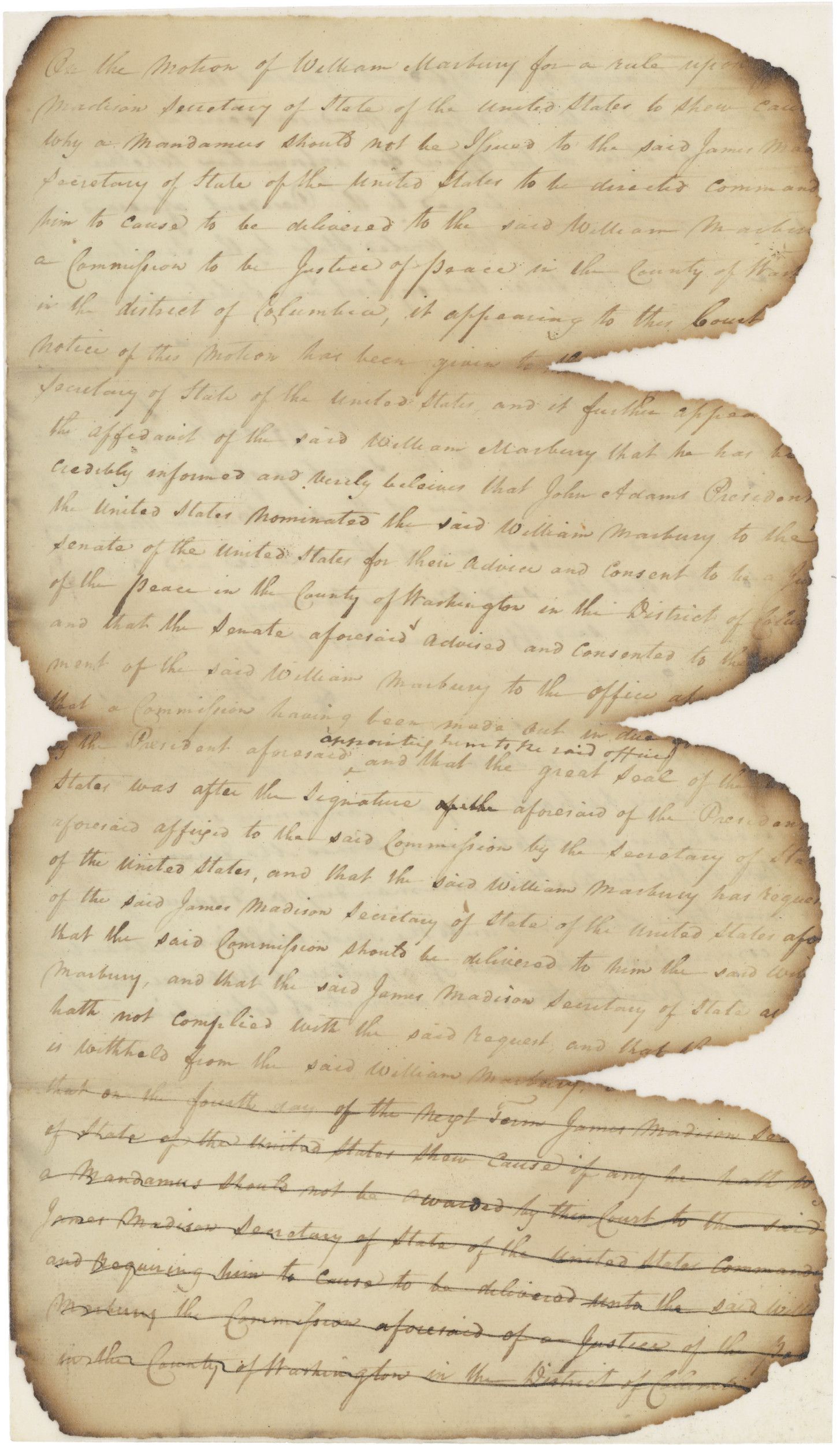
Draft of Motion Rule for Marbury v. Madison
Page 2
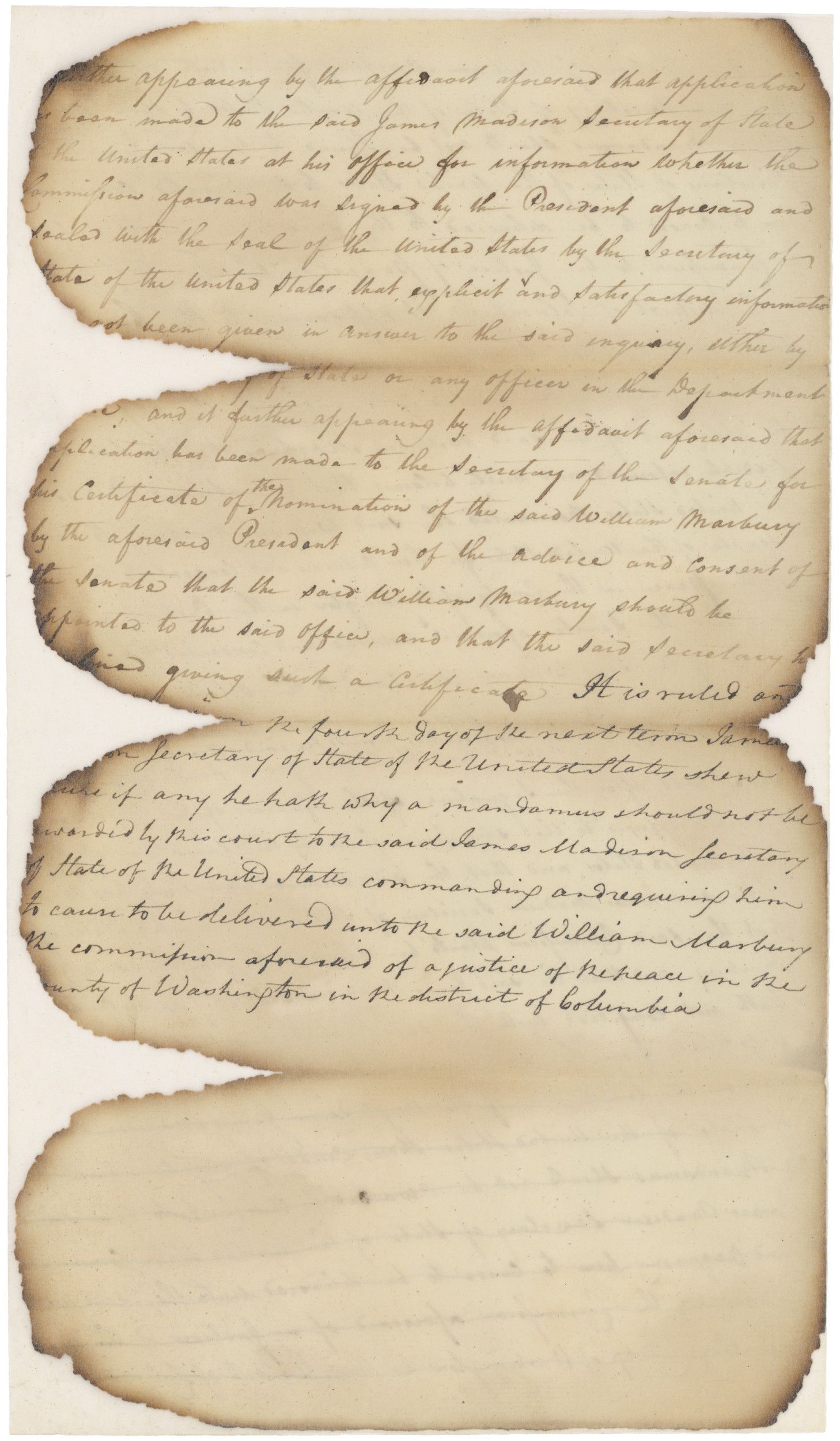
Document
Attempted Override of President Richard Nixon's Veto of S. 518, an Act to Abolish the Offices of the Director and Deputy Director of the Office of Management and Budget
1973
This primary source comes from the Records of the U.S. Senate.
National Archives Identifier: 2127368
Full Citation: Attempted Override of President Richard Nixon's Veto of S. 518, an Act to Abolish the Offices of the Director and Deputy Director of the Office of Management and Budget; 1973; Records of the U.S. Senate, . [Online Version, https://docsteach.org/documents/document/attempted-override-of-president-richard-nixons-veto-of-s-518-an-act-to-abolish-the-offices-of-the-director-and-deputy-director-of-the-office-of-management-and-budget, April 26, 2024]Attempted Override of President Richard Nixon's Veto of S. 518, an Act to Abolish the Offices of the Director and Deputy Director of the Office of Management and Budget
Page 1
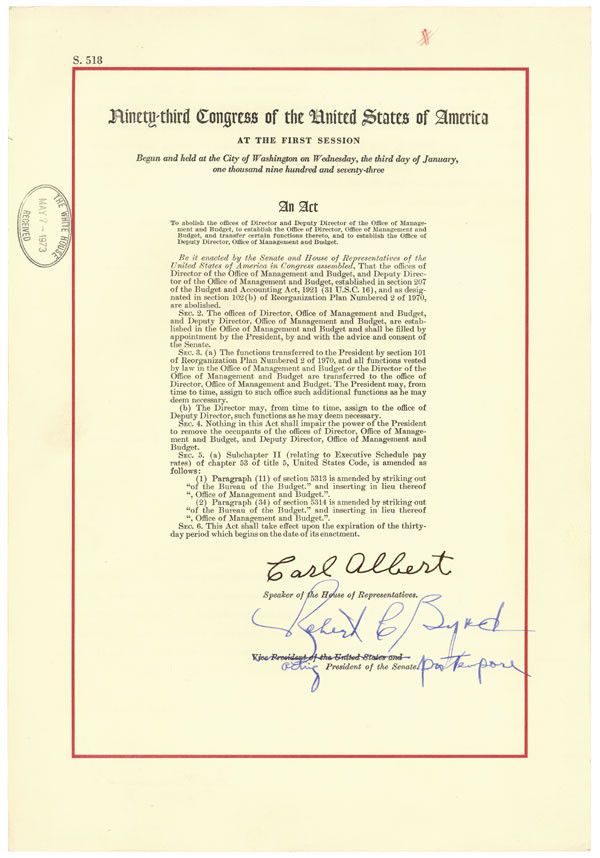
Attempted Override of President Richard Nixon's Veto of S. 518, an Act to Abolish the Offices of the Director and Deputy Director of the Office of Management and Budget
Page 2
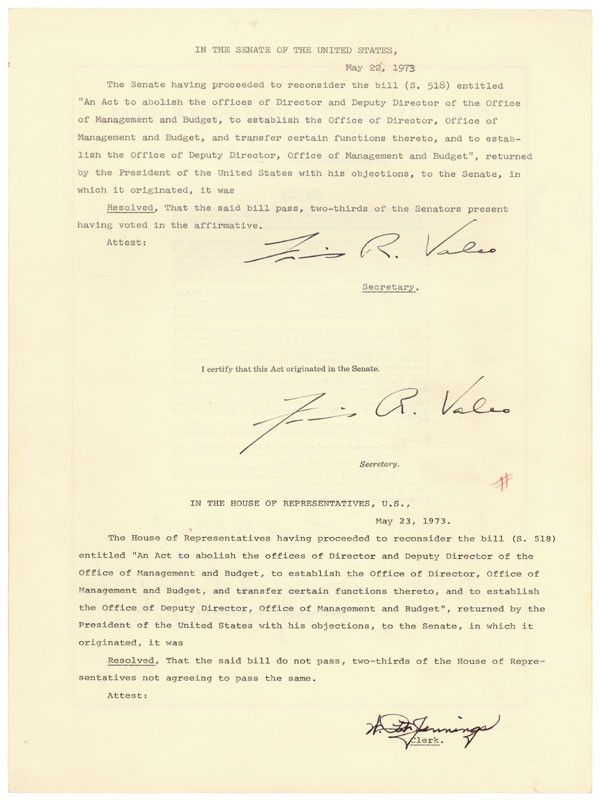
Attempted Override of President Richard Nixon's Veto of S. 518, an Act to Abolish the Offices of the Director and Deputy Director of the Office of Management and Budget
Page 3
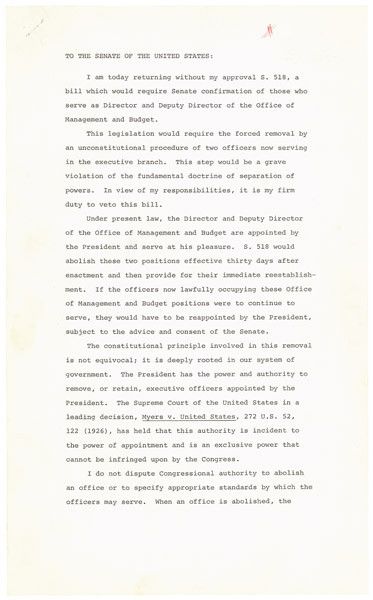
Attempted Override of President Richard Nixon's Veto of S. 518, an Act to Abolish the Offices of the Director and Deputy Director of the Office of Management and Budget
Page 4
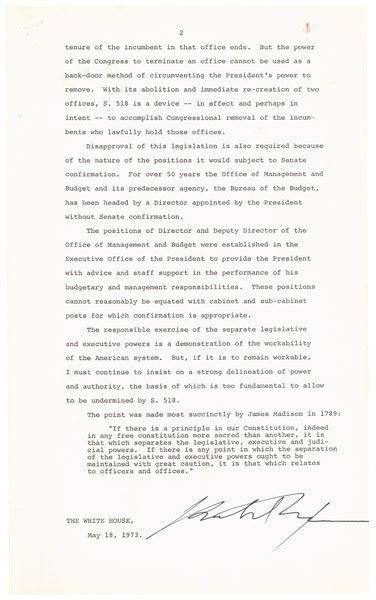
Document
Message of President John Adams nominating John Marshall to be Chief Justice of the Supreme Court
1/20/1801
President John Adams sent this message nominating John Marshall to be Chief Justice of the Supreme Court.
Transcript
Gentlemen of the SenateI nominate John Marshall Secretary of State to be Chief Justice of the United States in the place of John Jay who has declined his appointment
John Adams
United States
Jan 20 1801
This primary source comes from the Records of the U.S. Senate.
National Archives Identifier: 306290
Full Citation: Message of President John Adams nominating John Marshall to be Chief Justice of the Supreme Court; 1/20/1801; Anson McCook Collection of Presidential Signatures, 1789 - 1975; Records of the U.S. Senate, ; National Archives Building, Washington, DC. [Online Version, https://docsteach.org/documents/document/marshall-nomination, April 26, 2024]Message of President John Adams nominating John Marshall to be Chief Justice of the Supreme Court
Page 1
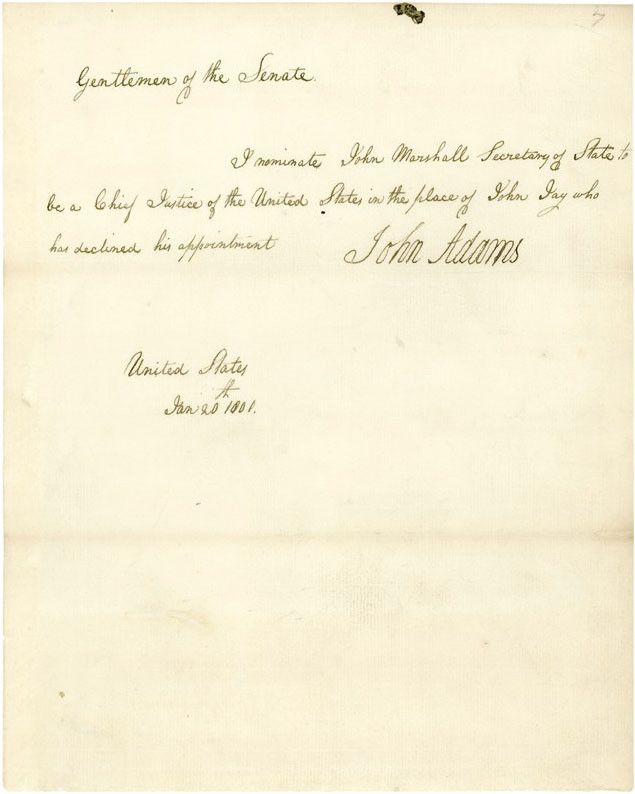
Document
Judiciary Act of 1789
9/24/1789
One of the first acts of the new Congress after the U.S. Constitution was ratified was to establish a Federal court system through the Judiciary Act, signed by President George Washington on September 24, 1789.
The founders of the new nation believed that the establishment of a national judiciary was one of their most important tasks. Yet Article III of the Constitution, the provision that deals with the judiciary branch of government, is markedly smaller than Articles I and II, which created the legislative and executive branches.
The generality of Article III of the Constitution raised questions that Congress had to address in the Judiciary Act of 1789. These questions had no easy answers, and the solutions to them were achieved politically. The First Congress decided that it could regulate the jurisdiction of all Federal courts. And in the Judiciary Act of 1789, Congress:
The decision to grant Federal courts a jurisdiction more restrictive than that allowed by the Constitution represented a recognition by the Congress that the people of the United States would not find a full-blown Federal court system palatable at that time.
For nearly all of the next century the judicial system remained essentially as established by the Judiciary Act of 1789. Only after the country had expanded across a continent and had been torn apart by the Civil War were major changes made. A separate tier of appellate circuit courts created in 1891 removed the burden of circuit riding from the shoulders of the Supreme Court justices, but otherwise left intact the judicial structure.
With minor adjustments, it is the same system we have today. Congress has continued to build on the interpretation of the drafters of the first judiciary act in exercising a discretionary power to expand or restrict Federal court jurisdiction. Though opinions as to what constitutes the proper balance of Federal and state concerns vary no less today than they did two centuries ago.
The founders of the new nation believed that the establishment of a national judiciary was one of their most important tasks. Yet Article III of the Constitution, the provision that deals with the judiciary branch of government, is markedly smaller than Articles I and II, which created the legislative and executive branches.
The generality of Article III of the Constitution raised questions that Congress had to address in the Judiciary Act of 1789. These questions had no easy answers, and the solutions to them were achieved politically. The First Congress decided that it could regulate the jurisdiction of all Federal courts. And in the Judiciary Act of 1789, Congress:
- established with great particularity a limited jurisdiction for the district and circuit courts,
- gave the Supreme Court the original jurisdiction provided for in the Constitution, and
- granted the Supreme Court appellate jurisdiction in cases from the Federal circuit courts and from the state courts where those courts rulings had rejected Federal claims.
The decision to grant Federal courts a jurisdiction more restrictive than that allowed by the Constitution represented a recognition by the Congress that the people of the United States would not find a full-blown Federal court system palatable at that time.
For nearly all of the next century the judicial system remained essentially as established by the Judiciary Act of 1789. Only after the country had expanded across a continent and had been torn apart by the Civil War were major changes made. A separate tier of appellate circuit courts created in 1891 removed the burden of circuit riding from the shoulders of the Supreme Court justices, but otherwise left intact the judicial structure.
With minor adjustments, it is the same system we have today. Congress has continued to build on the interpretation of the drafters of the first judiciary act in exercising a discretionary power to expand or restrict Federal court jurisdiction. Though opinions as to what constitutes the proper balance of Federal and state concerns vary no less today than they did two centuries ago.
Transcript
Congress of the United States,begun and held at the City of New York on
Wednesday the fourth of March one thousand seven hundred and eighty nine.
An Act to establish the Judicial Courts of the United States.
Be it enacted by the Senate and House of Representatives of the United States of America in Congress assembled, That the supreme court of the United States shall consist of a chief justice and five associate justices, any four of whom shall be a quorum, and shall hold annually at the seat of government two sessions, the one commencing the first Monday of February, and the other the first Monday of August. That the associate justices shall have precedence according to the date of their commissions, or when the commissions of two or more of them bear date on the same day, according to their respective ages.
And be it further enacted, That the United States shall be, and they hereby are divided into thirteen districts, to be limited and called as follows, to wit: one to consist of that part of the State of Massachusetts which lies easterly of the State of New Hampshire, and to be called Maine District; one to consist of the State of New Hampshire, and to be called New Hampshire District; one to consist of the remaining part of the State of Massachusetts, and to be called Massachusetts district; one to consist of the State of Connecticut, and to be called Connecticut District; one to consist of the State of New York, and to be called New York District; one to consist of the State of New Jersey, and to be called New Jersey District; one to consist of the State of Pennsylvania, and to be called Pennsylvania District; one to consist of the State of Delaware, and to be called Delaware District; one to consist of the State of Maryland, and to be called Maryland District; one to consist of the State of Virginia, except that part called the District of Kentucky, and to be called Virginia District; one to consist of the remaining part of the State of Virginia, and to be called Kentucky District; one to consist of the State of South Carolina, and to be called South Carolina District; and one to consist of the State of Georgia, and to be called Georgia District.
And be it further enacted, That there be a court called a District Court, in each of the afore mentioned districts, to consist of one judge, who shall reside in the district for which he is appointed, and shall be called a District Judge, and shall hold annually four sessions, the first of which to commence as follows, to wit: in the districts of New York and of New Jersey on the first, in the district of Pennsylvania on the second, in the district of Connecticut on the third, and in the district of Delaware on the fourth, Tuesdays of November next; in the districts of Massachusetts, of Maine, and of Maryland, on the first, in the district of Georgia on the second, and in the districts of New Hampshire, of Virginia, and of Kentucky, on the third Tuesdays of December next; and the other three sessions progressively in the respective districts on the like Tuesdays of every third calendar month afterwards, and in the district of South Carolina, on the third Monday in March and September, the first Monday in July, and the second Monday in December of each and every year, commencing in December next; and that the District Judge shall have power to hold special courts at his discretion. That the stated District Court shall be held at the places following, to wit: in the district of Maine, at Portland and Pownalsborough alternately, beginning at the first; in the district of New Hampshire, at Exeter and Portsmouth alternately, beginning at the first; in the district of Massachusetts, at Boston and Salem alternately, beginning at the first; in the district of Connecticut, alternately at Hartford and New Haven, beginning at the first; in the district of New York, at New York; in the district of New Jersey, alternately at New Brunswick and Burlington, beginning at the first; in the district of Pennsylvania, at Philadelphia and York Town alternately, beginning at the first; in the district of Delaware, alternately at Newcastle and Dover, beginning at the first; in the district of Maryland, alternately at Baltimore and Easton, beginning at the first; in the district of Virginia, alternately at Richmond and Williamsburgh, beginning at the first; in the district of Kentucky, at Harrodsburgh; in the district of South Carolina, at Charleston; and in the district of Georgia, alternately at Savannah and Augusta, beginning at the first; and that the special courts shall be held at the same place in each district as the stated courts, or in districts that have two, at either of them, in the discretion of the judge, or at such other place in the district, as the nature of the business and his discretion shall direct. And that in the districts that have but one place for holding the District Court, the records thereof shall be kept at that place; and in districts that have two, at that place in each district which the judge shall appoint.
And be it further enacted, That the before mentioned districts, except those of Maine and Kentucky, shall be divided into three circuits, and be called the eastern, the middle, and the southern circuit. That the eastern circuit shall consist of the districts of New Hampshire, Massachusetts, Connecticut and New York; that the middle circuit shall consist of the districts of New Jersey, Pennsylvania, Delaware, Maryland and Virginia; and that the southern circuit shall consist of the districts of South Carolina and Georgia, and that there shall be held annually in each district of said circuits, two courts, which shall be called Circuit Courts, and shall consist of any two justices of the Supreme Court, and the district judge of such districts, any two of whom shall constitute a quorum: Provided, That no district judge shall give a vote in any case of appeal or error from his own decision; but may assign the reasons of such his decision.
And be it further enacted, That the first session of the said circuit court in the several districts shall commence at the times following, to wit: in New Jersey on the second, in New York on the fourth, in Pennsylvania on the eleventh, in Connecticut on the twenty-second, and in Delaware on the twenty-seventh, days of April next; in Massachusetts on the third, in Maryland on the seventh, in South Carolina on the twelfth, in New Hampshire on the twentieth, in Virginia on the twenty-second, and in Georgia on the twenty-eighth, days of May next, and the subsequent sessions in the respective districts on the like days of every sixth calendar month afterwards, except in South Carolina, where the session of the said court shall commence on the first, and in Georgia where it shall commence on the seventeenth day of October, and except when any of those days shall happen on a Sunday, and then the session shall commence on the next day following. And the sessions of the said circuit court shall be held in the district of New Hampshire, at Portsmouth
and Exeter alternately, beginning at the first; in the district of Massachusetts, at Boston; in the district of Connecticut, alternately at Hartford and New Haven, beginning at the last; in the district of New York, alternately at New York and Albany, beginning at the first; in the district of New Jersey, at Trenton; in the district of Pennsylvania, alternately at Philadelphia and Yorktown, beginning at the first; in the district of Delaware, alternately at New Castle and Dover, beginning at the first; in the district of Maryland, alternately at Annapolis and Easton, beginning at the first; in the district of Virginia, alternately at Charlottesville and Williamsburgh, beginning at the first; in the district of South Carolina, alternately at Columbia and Charleston, beginning at the first; and in the district of Georgia, alternately at Savannah and Augusta, beginning at the first. And the circuit courts shall have power to hold special sessions for the trial of criminal causes at any other time at their discretion, or at the discretion of the Supreme Court.
And be it further enacted, That the Supreme Court may, by any one or more of its justices being present, be adjourned from day to day until a quorum be convened; and that a circuit court may also be adjourned from day to day by any one of its judges, or if none are present, by the marshal of the district until a quorum be convened; and that a district court, in case of the inability of the judge to attend at the commencement of a session, may by virtue of a written order from the said judge, directed to the marshal of the district, be adjourned by the said marshal to such day, antecedent to the next stated session of the said court, as in the said order shall be appointed; and in case of the death of the said judge, and his vacancy not being supplied, all process, pleadings and proceedings of what nature soever, pending before the said court, shall be continued of course until the next stated session after the appointment and acceptance of the office by his successor.
And be it [further] enacted, That the Supreme Court, and the district courts shall have power to appoint clerks for their respective courts, and that the clerk for each district court shall be clerk also of the circuit court in such district, and each of the said clerks shall, before he enters upon the execution of his office, take the following oath or affirmation, to wit: "I, A. B., being appointed clerk of , do solemnly swear, or affirm, that I will truly and faithfully enter and record all the orders, decrees, judgments and proceedings of the said court, and that I will faithfully and impartially discharge and perform all the duties of my said office, according to the best of my abilities and understanding. So help me God." Which words, so help me God, shall be omitted in all cases where an affirmation is admitted instead of an oath. And the said clerks shall also severally give bond, with sufficient sureties, (to be approved of by the Supreme and district courts respectively) to the United States, in the sum of two thousand dollars, faithfully to discharge the duties of his office, and seasonably to record the decrees, judgments and determinations of the court of which he is clerk.
And be it further enacted, That the justices of the Supreme Court, and the district judges, before they proceed to execute the duties of their respective offices, shall take the following oath or affirmation, to wit: "I, A. B., do solemnly swear or affirm, that I will administer justice without respect to persons, and do equal right to the poor and to the rich, and that I will faithfully and impartially discharge and perform all the duties incumbent on me as , according to the best of my abilities and understanding, agreeably to the constitution, and laws of the United States. So help me God."
And be it further enacted, That the district courts shall have, exclusively of the courts of the several States, cognizance of all crimes and offences that shall be cognizable under the authority of the United States, committed within their respective districts, or upon the high seas; where no other punishment than whipping, not exceeding thirty stripes, a fine not exceeding one hundred dollars, or a term of imprisonment not exceeding six months, is to be inflicted; and shall also have exclusive original cognizance of all civil causes of admiralty and maritime jurisdiction, including all seizures under laws of impost, navigation or trade of the United States, where the seizures are made, on waters which are navigable from the sea by vessels of ten or more tons burthen, within their respective districts as well as upon the high seas; saving to suitors, in all cases, the right of a common law remedy, where the common law is competent to give it; and shall also have exclusive original cognizance of all seizures on land, or other waters than as aforesaid, made, and of all suits for penalties and forfeitures incurred, under the laws of the United States. And shall also have cognizance, concurrent with the courts of the several States, or the circuit courts, as the case may be, of all causes where an alien sues for a tort only in violation of the law of nations or a treaty of the United States. And shall also have cognizance, concurrent as last mentioned, of all suits at common law where the United States sue, and the matter in dispute amounts, exclusive of costs, to the sum or value of one hundred dollars. And shall also have jurisdiction exclusively of the courts of the several States, of all suits against consuls or vice-consuls, except for offences above the description aforesaid. And the trial of issues in fact, in the district courts, in all causes except civil causes of admiralty and maritime jurisdiction, shall be by jury.
And be it further enacted, That the district court in Kentucky district shall, besides the jurisdiction aforesaid, have jurisdiction of all other causes, except of appeals and writs of error, hereinafter made cognizable in a circuit court, and shall proceed therein in the same manner as a circuit court, and writs of error and appeals shall lie from decisions therein to the Supreme Court in the same causes, as from a circuit court to the Supreme Court, and under the same regulations. And the district court in Maine district shall, besides the jurisdiction herein before granted, have jurisdiction of all causes, except of appeals and writs of error herein after made cognizable in a circuit court, and shall proceed therein in the same manner as a circuit court: And writs of error shall lie from decisions therein to the circuit court in the district of Massachusetts in the same manner as from other district courts to their respective circuit courts.
And be it further enacted, That the circuit courts shall have original cognizance, concurrent with the courts of the several States, of all suits of a civil nature at common law or in equity, where the matter in dispute exceeds, exclusive of costs, the sum or value of five hundred dollars, and the United States are plaintiffs, or petitioners; or an alien is a party, or the suit is between a citizen of the State where the suit is brought, and a citizen of another State. And shall have exclusive cognizance of all crimes and offences cognizable under the authority of the United States, except where this act otherwise provides, or the laws of the United States shall otherwise direct, and concurrent jurisdiction with the district courts of the crimes and offences cognizable therein. But no person shall be arrested in one district for trial in another, in any
civil action before a circuit or district court. And no civil suit shall be brought before either of said courts against an inhabitant of the United States, by any original process in any other district than that whereof he is an inhabitant, or in which he shall be found at the time of serving the writ, nor shall any district or circuit court have cognizance of any suit to recover the contents of any promissory note or other chose in action in favour of an assignee, unless a suit might have been prosecuted in such court to recover the said contents if no assignment had been made, except in cases of foreign bills of exchange. And the circuit courts shall also have appellate jurisdiction from the district courts under the regulations and restrictions herein after provided.
And be it further enacted, That if a suit be commenced in any state court against an alien, or by a citizen of the state in which the suit is brought against a citizen of another state, and the matter in dispute exceeds the aforesaid sum or value of five hundred dollars, exclusive of costs, to be made to appear to the satisfaction of the court; and the defendant shall, at the time of entering his appearance in such state court, file a petition for the removal of the cause for trial into the next circuit court, to be held in the district where the suit is pending, or if in the district of Maine to the district court next to be holden therein, or if in Kentucky district to the district court next to be holden therein, and offer good and sufficient surety for his entering in such court, on the first day of its session, copies of said process against him, and also for his there appearing and entering special bail in the cause, if special bail was originally requisite therein, it shall then be the duty of the state court to accept the surety, and proceed no further in the cause, and any bail that may have been originally taken shall be discharged, and the said copies being entered as aforesaid, in such court of the United States, the cause shall there proceed in the same manner as if it had been brought there by original process. And any attachment of the goods or estate of the defendant by the original process, shall hold the goods or estate so attached, to answer the final judgment in the same manner as by the laws of such state they would have been holden to answer final judgment, had it been rendered by the court in which the suit commenced. And if in any action commenced in a state court, the title of land be concerned, and the parties are citizens of the same state, and the matter in dispute exceeds the sum or value of five hundred dollars, exclusive of costs, the sum or value being made to appear to the satisfaction of the court, either party, before the trial, shall state to the court and make affidavit if they require it, that he claims and shall rely upon a right or title to the land, under a grant from a state other than that in which the suit is pending, and produce the original grant or an exemplification of it, except where the loss of public records shall put it out of his power, and shall move that the adverse party inform the court, whether he claims a right or title to the land under a grant from the state in which the suit is pending; the said adverse [party] shall give such information, or otherwise not be allowed to plead such grant, or give it in evidence upon the trial, and if he informs that he does claim under such grant, the party claiming under the grant first mentioned may then, on motion, remove the cause for trial to the next circuit court to be holden in such district, or if in the district of Maine, to the court next to be holden therein; or if in Kentucky district, to the district court next to be holden therein; but if he is the defendant, shall do it under the same regulations as in the before-mentioned case of the removal of a cause into such court by an alien; and neither party removing the cause, shall be allowed to plead or give evidence of any other title than that by him stated as aforesaid, as the ground of his claim; and the trial of issues in fact in the circuit courts shall, in all suits, except those of equity, and of admiralty, and maritime jurisdiction, be by jury.
And be it further enacted, That the Supreme Court shall have exclusive jurisdiction of all controversies of a civil nature, where a state is a party, except between a state and its citizens; and except also between a state and citizens of other states, or aliens, in which latter case it shall have original but not exclusive jurisdiction. And shall have exclusively all such jurisdiction of suits or proceedings against ambassadors, or other public ministers, or their domestics, or domestic servants, as a court of law can have or exercise consistently with the law of nations; and original, but not exclusive jurisdiction of all suits brought by ambassadors, or other public ministers, or in which a consul, or vice consul, shall be a party. And the trial of issues in fact in the Supreme Court, in all actions at law against citizens of the United States, shall be by jury. The Supreme Court shall also have appellate jurisdiction from the circuit courts and courts of the several states, in the cases herein after specially provided for; and shall have power to issue writs of prohibition to the district courts, when proceeding as courts of admiralty and maritime jurisdiction, and writs of mandamus, in cases warranted by the principles and usages of law, to any courts appointed, or persons holding office, under the authority of the United States.
And be it further enacted, That all the before-mentioned courts of the United States, shall have power to issue writs of scire facias, habeas corpus, and all other writs not specially provided for by statute, which may be necessary for the exercise of their respective jurisdictions, and agreeable to the principles and usages of law. And that either of the justices of the supreme court, as well as judges of the district courts, shall have power to grant writs of habeas corpus for the purpose of an inquiry into the cause of commitment. Provided, That writs of habeas corpus shall in no case extend to prisoners in gaol, unless where they are in custody, under or by colour of the authority of the United States, or are committed for trial before some court of the same, or are necessary to be brought into court to testify.
And be it further enacted, That all the said courts of the United States, shall have power in the trial of actions at law, on motion and due notice thereof being given, to require the parties to produce books or writings in their possession or power, which contain evidence pertinent to the issue, in cases and under circumstances where they might be compelled to produce the same by the ordinary rules of proceeding in chancery; and if a plaintiff shall fail to comply with such order, to produce books or writings, it shall be lawful for the courts respectively, on motion, to give the like judgment for the defendant as in cases of nonsuit; and if a defendant shall fail to comply with such order, to produce books or writings, it shall be lawful for the courts respectively on motion as aforesaid, to give judgment against him or her by default.
And be it further enacted, That suits in equity shall not be sustained in either of the courts of the United States, in any case where plain, adequate and complete remedy may be had at law.
And be it further enacted, That all the said courts of the United States shall have power to grant new trials, in cases where there has been a trial by jury for reasons for which new trials have usually been granted in the courts of law; and shall have power to impose and administer all necessary oaths or affirmations, and to punish by fine or imprisonment, at the discretion of said courts, all contempts of authority in any cause or hearing before the same; and to make and establish all necessary rules for the orderly conducting business in the said courts, provided such rules are not repugnant to the laws of the United States
And be it further enacted, That when in a circuit court, judgment upon a verdict in a civil action shall be entered, execution may on motion of either party, at the discretion of the court, and on such conditions for the security of the adverse party as they may judge proper, be stayed forty-two days from the time of entering judgment, to give time to file in the clerk's office of said court, a petition for a new trial. And if such petition be there filed within said term of forty-two days, with a certificate thereon from either of the judges of such court, that he allows the same to be filed, which certificate he may make or refuse at his discretion, execution shall of course be further stayed to the next session of said court. And if a new trial be granted, the former judgment shall be thereby rendered void.
And be it further enacted, That it shall be the duty of circuit courts, in causes in equity and of admiralty and maritime jurisdiction, to cause the facts on which they found their sentence or decree, fully to appear upon the record either from the pleadings and decree itself, or a state of the case agreed by the parties, or their counsel, or if they disagree by a stating of the case by the court.
And be it further enacted, That where in a circuit court, a plaintiff in an action, originally brought there, or a petitioner in equity, other than the United States, recovers less than the sum or value of five hundred dollars, or a libellant, upon his own appeal, less than the sum or value of three hundred dollars, he shall not be allowed, but at the discretion of the court, may be adjudged to pay costs.
And be it further enacted, That from final decrees in a district court in causes of admiralty and maritime jurisdiction, where the matter in dispute exceeds the sum or value of three hundred dollars, exclusive of costs, an appeal shall be allowed to the next circuit court, to be held in such district. Provided nevertheless, That all such appeals from final decrees as aforesaid, from the district court of Maine, shall be made to the circuit court, next to be holden after each appeal in the district of Massachusetts.
And be it further enacted, That final decrees and judgments in civil actions in a district court, where the matter in dispute exceeds the sum or value of fifty dollars, exclusive of costs, may be reexamined, and reversed or affirmed in a circuit court, holden in the same district, upon a writ of error, whereto shall be annexed and returned therewith at the day and place therein mentioned, an authenticated transcript of the record, an assignment of errors, and prayer for reversal, with a citation to the adverse party, signed by the judge of such district court, or a justice of the Supreme Court, the adverse party having at least twenty days notice. And upon a like process, may final judgments and decrees in civil actions, and suits in equity in a circuit court, brought there by original process, or removed there from courts of the several States, or removed there by appeal from a district court where the matter in dispute exceeds the sum or value of two thousand dollars, exclusive of costs, be re-examined and reversed or affirmed in the Supreme Court, the citation being in such case signed by a judge of such circuit court, or justice of the Supreme Court, and the adverse party having at least thirty days notice. But there shall be no reversal in either court on such writ of error for error in ruling any plea in abatement, other than a plea to the jurisdiction of the court, or such plea to a petition or bill in equity, as is in the nature of a demurrer, or for any error in fact. And writs of error shall not be brought but within five years after rendering or passing the judgment or decree complained of, or in case the person entitled to such writ of error be an infant, feme covert, non compos mentis, or imprisoned, then within five years as aforesaid, exclusive of the time of such disability. And every justice or judge signing a citation on any writ of error as aforesaid, shall take good and sufficient security, that the plaintiff in error shall prosecute his writ to effect, and answer all damages and costs if he fail to make his plea good.
And be it further enacted, That a writ of error as aforesaid shall be a supersedeas and stay execution in cases only where the writ of error is served, by a copy thereof being lodged for the adverse party in the clerks office where the record remains, within ten days, Sundays exclusive, after rendering the judgment or passing the decree complained of. Until the expiration of which term of ten days, executions shall not issue in any case where a writ of error may be a supersedeas; and whereupon such writ of error the Supreme or a circuit court shall affirm a judgment or decree, they shall adjudge or decree to the respondent in error just damages for his delay, and single or double costs at their discretion.
And be it further enacted, That when a judgment or decree shall be reversed in a circuit court, such court shall proceed to render such judgment or pass such decree as the district court should have rendered or passed; and the Supreme Court shall do the same on reversals therein, except where the reversal is in favour of the plaintiff, or petitioner in the original suit, and the damages to be assessed, or matter to be decreed, are uncertain, in which case they shall remand the cause for a final decision. And the Supreme Court shall not issue execution in causes that are removed before them by writs of error, but shall send a special mandate to the circuit court to award execution thereupon.
And be it further enacted, That a final judgment or decree in any suit, in the highest court of law or equity of a State in which a decision in the suit could be had, where is drawn in question the validity of a treaty or statute of, or an authority exercised under the United States, and the decision is against their validity; or where is drawn in question the validity of a statute of, or an authority exercised under any State, on the ground of their being repugnant to the constitution, treaties or laws of the United States, and the decision is in favour of such their validity, or where is drawn in question the construction of any clause of the constitution, or of a treaty, or statute of, or commission held under the United States, and the decision is against the title, right, privilege or exemption specially set up or claimed by either party, under such clause of the said Constitution, treaty, statute or commission, may be re-examined and reversed or affirmed in the Supreme Court of the United States upon a writ of error, the citation being signed by the chief justice, or judge or chancellor of the court rendering or passing the judgment or decree complained of, or by a justice of the Supreme Court of the United States, in the same manner and under the same regulations, and the writ shall have the same effect, as if the judgment or decree complained of had been rendered or passed in a circuit court, and the proceeding upon the reversal shall also be the same, except that the Supreme Court, instead of remanding the cause for a final decision as before provided, may at their discretion, if the cause shall have been once remanded before, proceed to a final decision of the same, and award execution. But no other error shall be assigned or regarded as a ground of reversal in any such case as aforesaid, than such as appears on the face of the record, and immediately respects the before mentioned questions of validity or construction of the said constitution, treaties, statutes, commissions, or authorities in dispute.
And be it further enacted, That in all causes brought before either of the courts of the United States to recover the forfeiture annexed to any
articles of agreement, covenant, bond, or other speciality, where the forfeiture, breach or non-performance shall appear, by the default or confession of the defendant, or upon demurrer, the court before whom the action is, shall render judgment therein for the plaintiff to recover so much as is due according to equity. And when the sum for which judgment should be rendered is uncertain, the same shall, if either of the parties request it, be assessed by a jury.
And be it further enacted, That a marshal shall be appointed in and for each district for the term of four years, but shall be removable from office at pleasure, whose duty it shall be to attend the district and circuit courts when sitting therein, and also the Supreme Court in the District in which that court shall sit. And to execute throughout the district, all lawful precepts directed to him, and issued under the authority of the United States, and he shall have power to command all necessary assistance in the execution of his duty, and to appoint as there shall be occasion, one or more deputies, who shall be removable from office by the judge of the district court, or the circuit court sitting within the district, at the pleasure of either; and before he enters on the duties of his office, he shall become bound for the faithful performance of the same, by himself and by his deputies before the judge of the district court to the United States, jointly and severally, with two good and sufficient sureties, inhabitants and freeholders of such district, to be approved by the district judge, in the sum of twenty thousand dollars, and shall take before said judge, as shall also his deputies, before they enter on the duties of their appointment, the following oath of office: "I, A. B., do solemnly swear or affirm, that I will faithfully execute all lawful precepts directed to the marshal of the district of ... under the authority of the United States, and true returns make, and in all things well and truly, and without malice or partiality, perform the duties of the office of marshal (or marshals deputy, as the case may be) of the district of ... , during my continuance in said office, and take only my lawful fees. So help me God."
And be it further enacted, That in all causes wherein the marshal or his deputy shall be a party, the writs and precepts therein shall be directed to such disinterested person as the court, or any justice or judge thereof may appoint, and the person so appointed, is hereby authorized to execute and return the same. And in case of the death of any marshal, his deputy or deputies shall continue in office, unless otherwise specially removed; and shall execute the same in the name of the deceased, until another marshal shall be appointed and sworn: And the defaults or misfeasances in office of such deputy or deputies in the mean time, as well as before, shall be adjudged a breach of the condition of the bond given, as before directed, by the marshal who appointed them; and the executor or administrator of the deceased marshal shall have like remedy for the defaults and misfeasances in office of such deputy or deputies during such interval, as they would be entitled to if the marshal had continued in life and in the exercise of his said office, until his successor was appointed, and sworn or affirmed: And every marshal or his deputy when removed from office, or when the term for which the marshal is appointed shall expire, shall have power notwithstanding to execute all such precepts as may be in their hands respectively at the time of such removal or expiration of office; and the marshal shall be held answerable for the delivery to his successor of all prisoners which may be in his custody at the time of his removal, or when the term for which he is appointed shall expire, and for that purpose may retain such prisoners in his custody until his successor shall be appointed and qualified as the law directs.
And be it further enacted, That in cases punishable with death, the trial shall be had in the county where the offence was committed, or where that cannot be done without great inconvenience, twelve petit jurors at least shall be summoned from thence. And jurors in all cases to serve in the courts of the United States shall be designated by lot or otherwise in each State respectively according to the mode of forming juries therein now practised, so far as the laws of the same shall render such designation practicable by the courts or marshals of the United States; and the jurors shall have the same qualifications as are requisite for jurors by the laws of the State of which they are citizens, to serve in the highest courts of law of such State, and shall be returned as there shall be occasion for them, from such parts of the district from time to time as the court shall direct, so as shall be most favourable to an impartial trial, and so as not to incur an unnecessary expense, or unduly to burthen the citizens of any part of the district with such services. And writs of venire facias when directed by the court shall issue from the clerks office, and shall be served and returned by the marshal in his proper person, or by his deputy, or in case the marshal or his deputy is not an indifferent person, or is interested in the event of the cause, by such fit person as the court shall specially appoint for that purpose, to whom they shall administer an oath or affirmation that he will truly and impartially serve and return such writ. And when from challenges or otherwise there shall not be a jury to determine any civil or criminal cause, the marshal or his deputy shall, by order of the court where such defect of jurors shall happen, return jurymen de talibus circumstantibus sufficient to complete the pannel; and when the marshal or his deputy are disqualified as aforesaid, jurors may be returned by such disinterested person as the court shall appoint.
And be it further enacted, That the mode of proof by oral testimony and examination of witnesses in open court shall be the same in all the courts of the United States, as well in the trial of causes in equity and of admiralty and maritime jurisdiction, as of actions at common law. And when the testimony of any person shall be necessary in any civil cause depending in any district in any court of the United States, who shall live at a greater distance from the place of trial than one hundred miles, or is bound on a voyage to sea, or is about to go out of the United States, or out of such district, and to a greater distance from the place of trial than as aforesaid, before the time of trial, or is ancient or very infirm, the deposition of such person may be taken de bene esse before any justice or judge of any of the courts of the United States, or before any chancellor, justice or judge of a supreme or superior court, mayor or chief magistrate of a city, or judge of a county court or court of common pleas of any of the United States, not being of counsel or attorney to either of the parties, or interested in the event of the cause, provided that a notification from the magistrate before whom the deposition is to be taken to the adverse party, to be present at the taking of the same, and to put interrogatories, if he think fit, be first made out and served on the adverse party or his attorney as either may be nearest, if either is within one hundred miles of the place of such caption, allowing time for their attendance after notified, not less than at the rate of one day, Sundays exclusive, for every twenty miles travel. And in causes of admiralty and maritime jurisdiction, or other cases of
seizure when a libel shall be filed, in which an adverse party is not named, and depositions of persons circumstanced as aforesaid shall be taken before a claim be put in, the like notification as aforesaid shall be given to the person having the agency or possession of the property libelled at the time of the capture or seizure of the same, if known to the libellant. And every person deposing as aforesaid shall be carefully examined and cautioned, and sworn or affirmed to testify the whole truth, and shall subscribe the testimony by him or her given after the same shall be reduced to writing, which shall be done only by the magistrate taking the deposition, or by the deponent in his presence. And the depositions so taken shall be retained by such magistrate until he deliver the same with his own hand into the court for which they are taken, or shall , together with a certificate of the reasons as aforesaid of their being taken, and of the notice if any given to the adverse party, be by him the said magistrate sealed up and directed to such court, and remain under his seal until opened in court. And any person may be compelled to appear and depose as aforesaid in the same manner as to appear and testify in court. And in the trial of any cause of admiralty or maritime jurisdiction in a district court, the decree in which may be appealed from, if either party shall suggest to and satisfy the court that probably it will not be in his power to produce the witnesses there testifying before the circuit court should an appeal be had, and shall move that their testimony be taken down in writing, it shall be so done by the clerk of the court. And if an appeal be had, such testimony may be used on the trial of the same, if it shall appear to the satisfaction of the court which shall try the appeal, that the witnesses are then dead or gone out of the United States, or to a greater distance than as aforesaid from the place where the court is sitting, or that by reason of age, sickness, bodily infirmity or imprisonment, they are unable to travel and appear at court, but not otherwise. And unless the same shall be made to appear on the trial of any cause, with respect to witnesses whose depositions may have been taken therein, such depositions shall not be admitted or used in the cause. Provided, That nothing herein shall be construed to prevent any court of the United States from granting a dedimus potestatem to take depositions according to common usage, when it may be necessary to prevent a failure or delay of justice, which power they shall severally possess, nor to extend to depositions taken in perpetuam rei memoriam, which if they relate to matters that may be cognizable in any court of the United States, a circuit court on application thereto made as a court of equity, may, according to the usages in chancery direct to be taken.
And be it enacted, That where any suit shall be depending in any court of the United States, and either of the parties shall die before final judgment, the executor or administrator of such deceased party who was plaintiff, petitioner, or defendant, in case the cause of action doth by law survive, shall have full power to prosecute or defend any such suit or action until final judgment; and the defendant or defendants are hereby obliged to answer thereto accordingly; and the court before whom such cause may be depending, is hereby empowered and directed to hear and determine the same, and to render judgment for or against the executor or administrator, as the case may require. And if such executor or administrator having been duly served with a scire facias from the office of the clerk of the court where such suit is depending, twenty days beforehand, shall neglect or refuse to become a party to the suit, the court may render judgment against the estate of the deceased party, in the same manner as if the executor or administrator had voluntarily made himself a party to the suit. And the executor or administrator who shall become a party as aforesaid, shall, upon motion to the court where the suit is depending, be entitled to a continuance of the same until the next term of the said court. And if there be two or more plaintiffs or defendants, and one or more of them shall die, if the cause of action shall survive to the surviving plaintiff or plaintiffs, or against the surviving defendant or defendants, the writ or action shall not be thereby abated; but such death being suggested upon the record, the action shall proceed at the suit of the surviving plaintiff or plaintiffs against the surviving defendant or defendants.
And be it further enacted, That no summons, writ, declaration, return, process, judgment, or other proceedings in civil causes in any of the courts of the United States, shall be abated, arrested, quashed or reversed, for any defect or want of form, but the said courts respectively shall proceed and give judgment according as the right of the cause and matter in law shall appear unto them, without regarding any imperfections, defects, or want of form in such writ, declaration, or other pleading, return, process, judgment, or course of proceeding whatsoever, except those only in cases of demurrer, which the party demurring shall specially sit down and express together with his demurrer as the cause thereof. And the said courts respectively shall and may, by virtue of this act, from time to time, amend all and every such imperfections, defects and wants of form, other than those only which the party demurring shall express as aforesaid, and may at any time permit either of the parties to amend any defect in the process or pleadings, upon such conditions as the said courts respectively shall in their discretion, and by their rules prescribe.
And be it further enacted, That for any crime or offence against the United States, the offender may, by any justice or judge of the United States, or by any justice of the peace, or other magistrate of any of the United States where he may be found agreeably to the usual mode of process against offenders in such state, and at the expense of the United States, be arrested, and imprisoned or bailed, as the case may be, for trial before such court of the United States as by this act has cognizance of the offence. And copies of the process shall be returned as speedily as may be into the clerks office of such court, together with the recognizances of the witnesses for their appearance to testify in the case; which recognizances the magistrate before whom the examination shall be, may require on pain of imprisonment. And if such commitment of the offender, or the witnesses shall be in a district other than that in which the offence is to be tried, it shall be the duty of the judge of that district where the delinquent is imprisoned, seasonably to issue, and of the marshal of the same district to execute, a warrant for the removal of the offender, and the witnesses, or either of them, as the case may be, to the district in which the trial is to be had. And upon all arrests in criminal cases, bail shall be admitted, except where the punishment may be death, in which cases it shall not be admitted but by the supreme or a circuit court, or by a justice of the supreme court, or a judge of a district court, who shall exercise their discretion therein, regarding the nature and circumstances of the offence, and of the evidence, and the usages of law. And if a person committed by
a justice of the supreme or a judge of a district court for an offence not punishable with death, shall afterwards procure bail, and there be no judge of the United States in the district to take the same, it may be taken by any judge of the supreme or superior court of law of such state.
And be it further enacted, That the laws of the several states, except where the constitution, treaties or statutes of the United States shall otherwise require or provide, shall be regarded as rules of decision in trials at common law in the courts of the United States in cases where they apply.
And be it further enacted, That in all courts of the United States, the parties may plead and manage their own causes personally or by assistance of such counsel or attorneys at law as by the rules of the said courts respectively shall be permitted to manage and conduct causes therein. And there shall be appointed in each district a meet person learned in the law to act as attorney for the United States in such district, who shall be sworn or affirmed to the faithful execution of his office, whose duty it shall be to prosecute in such district all delinquents for crimes and offences, cognizable under the authority of the United States, and all civil actions in which the United States shall be concerned, except before the supreme court in the district in which that court shall be holden. And he shall receive as compensation for his services such fees as shall be taxed therefor in the respective courts before which the suits or prosecutions shall be. And there shall also be appointed a meet person, learned in the law, to act as attorney-general for the United States, who shall be sworn or affirmed to a faithful execution of his office; whose duty it shall be to prosecute and conduct all suits in the Supreme Court in which the United States shall be concerned, and to give his advice and opinion upon questions of law when required by the President of the United States, or when requested by the heads of any of the departments, touching any matters that may concern their departments, and shall receive such compensation for his services as shall by law be provided.
Frederick Augustus Muhlenberg, Speaker of the House of Representatives
John Adams, Vice-President of the United States, and President of the Senate
APPROVED, September the Twenty fourth, 1789.
George Washington, President of the United States
This primary source comes from the General Records of the United States Government.
National Archives Identifier: 1501550
Full Citation: Judiciary Act of 1789; 9/24/1789; Enrolled Acts and Resolutions of Congress, 1789 - 2011; General Records of the United States Government, ; National Archives Building, Washington, DC. [Online Version, https://docsteach.org/documents/document/judiciary-act-1789, April 26, 2024]Judiciary Act of 1789
Page 1
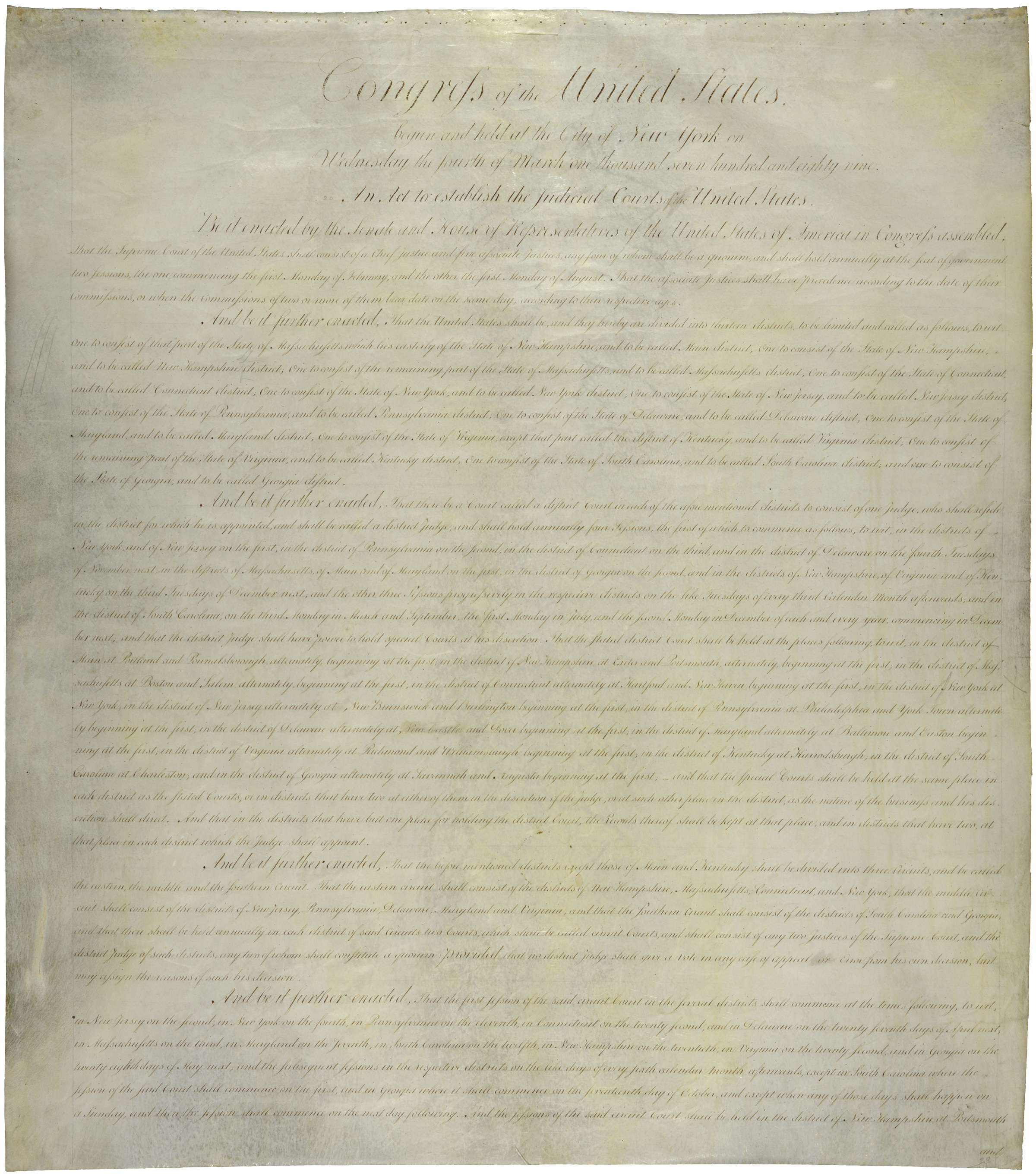
Judiciary Act of 1789
Page 2
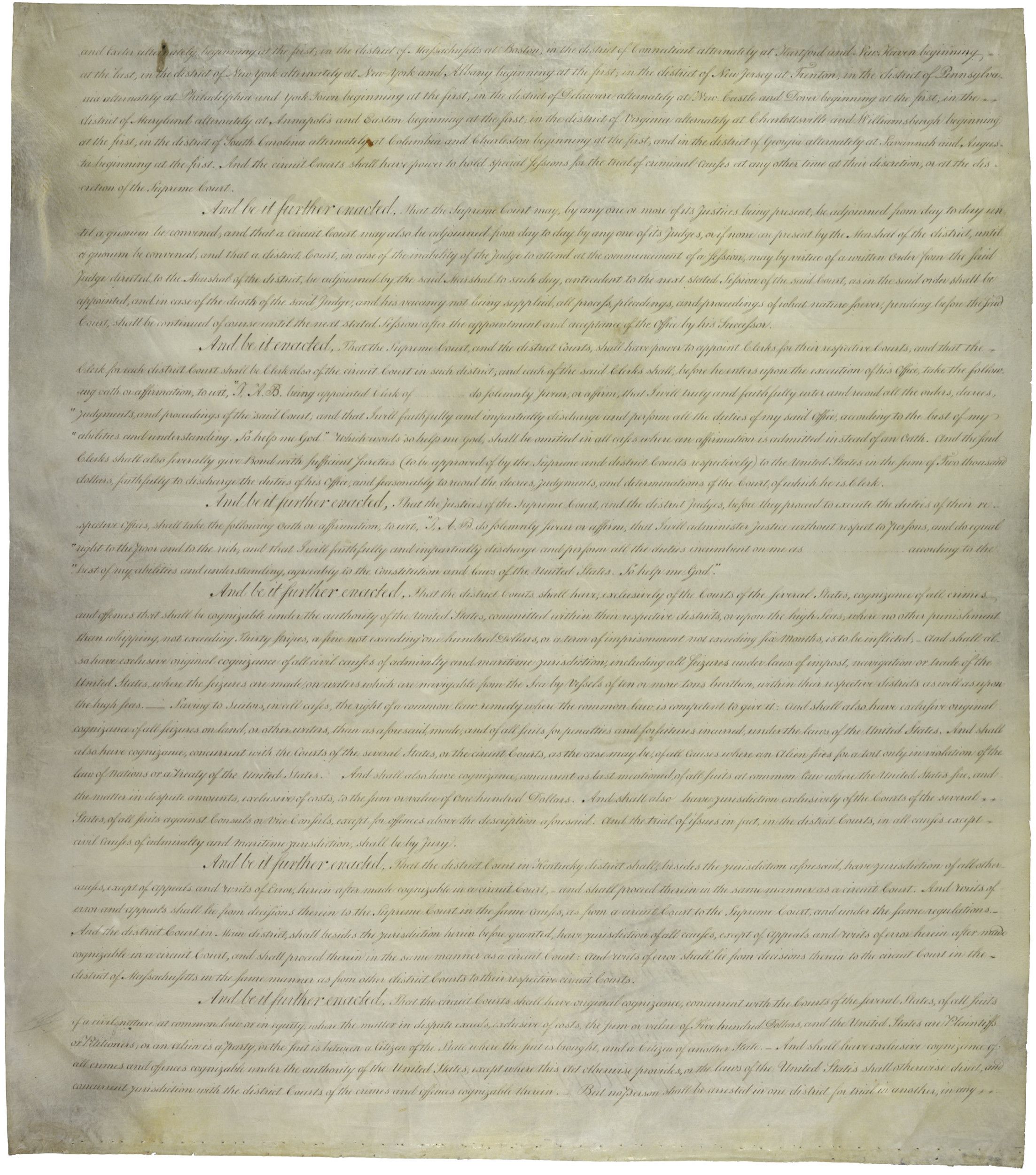
Judiciary Act of 1789
Page 3
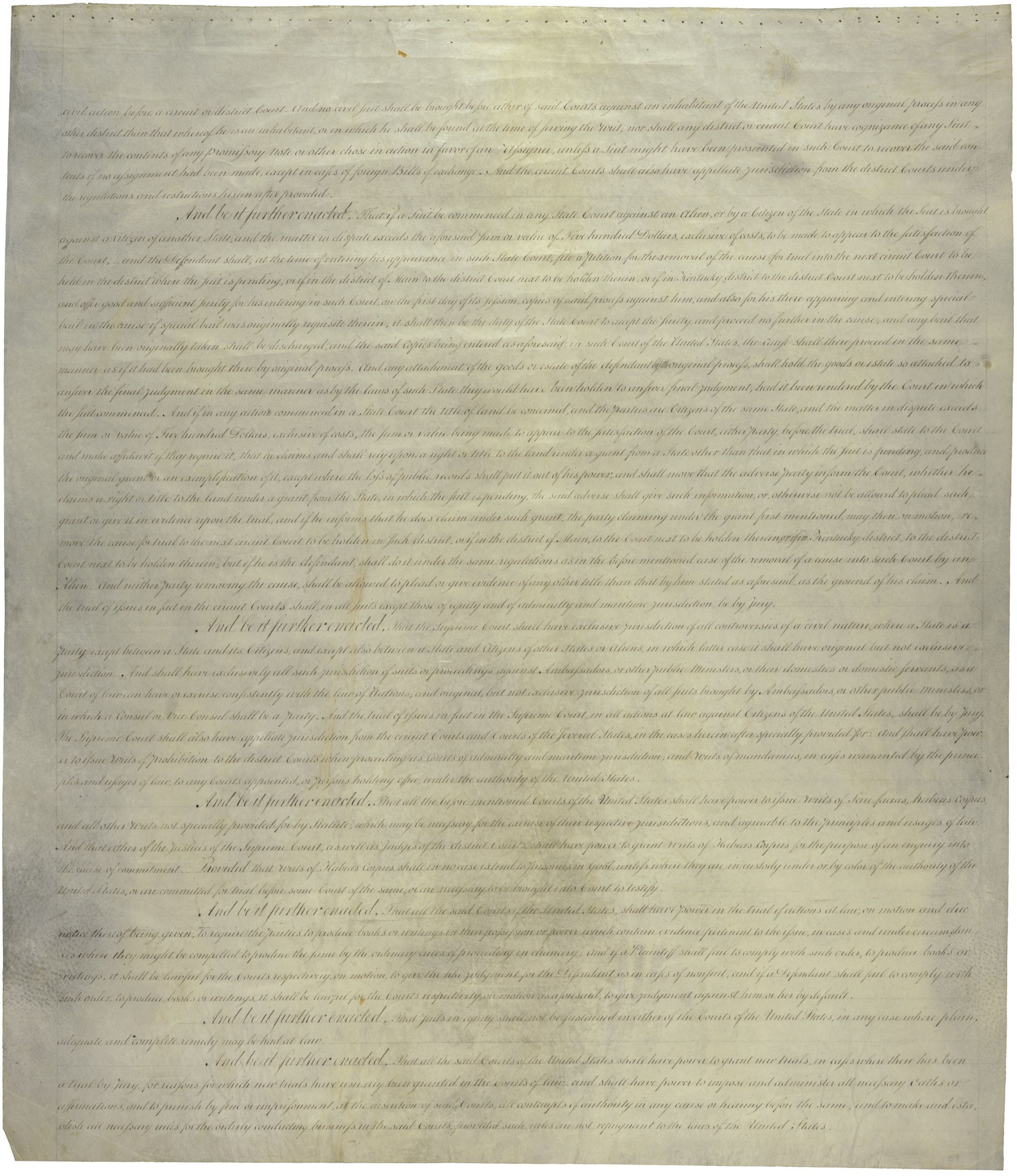
Judiciary Act of 1789
Page 4
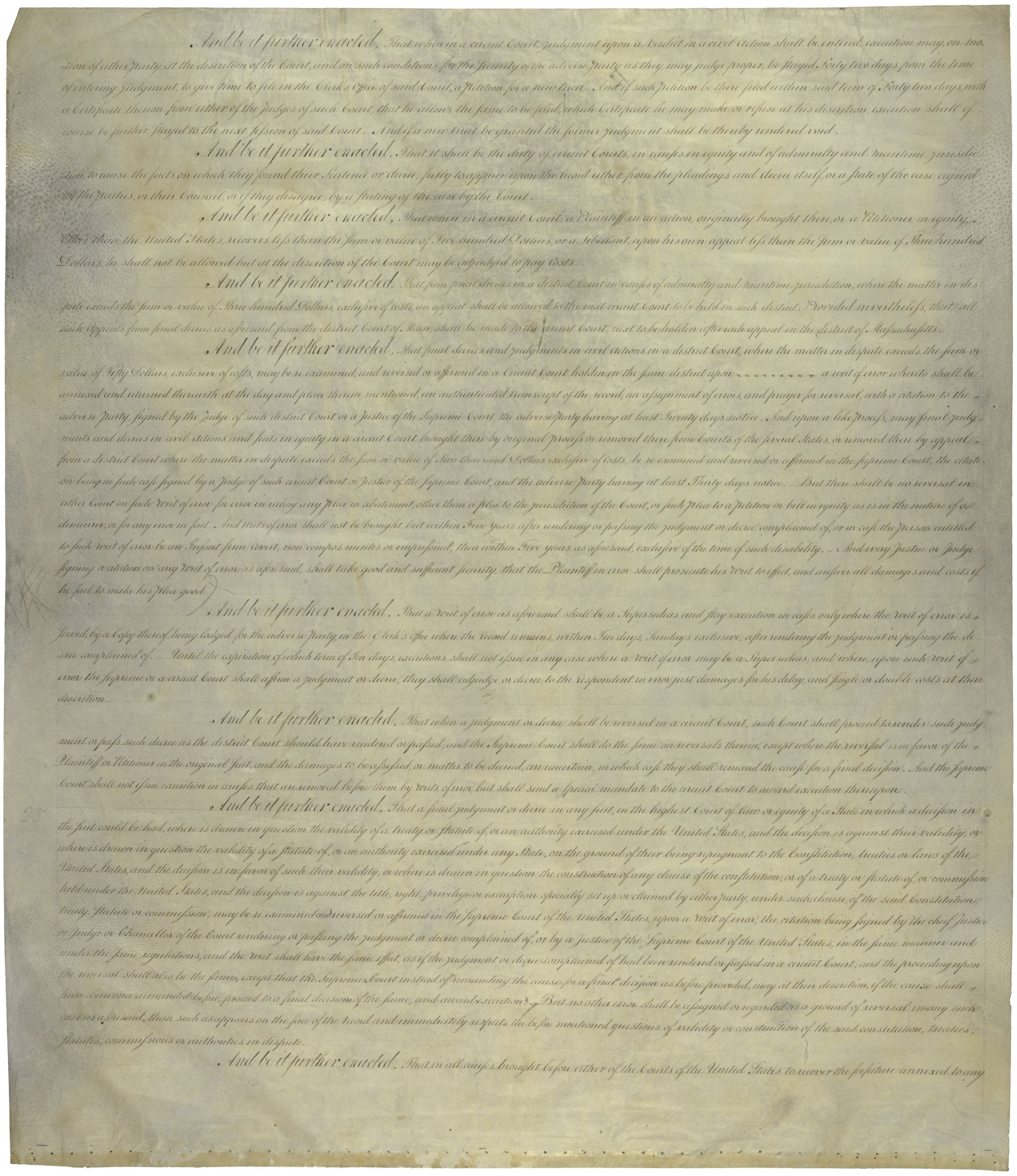
Judiciary Act of 1789
Page 5
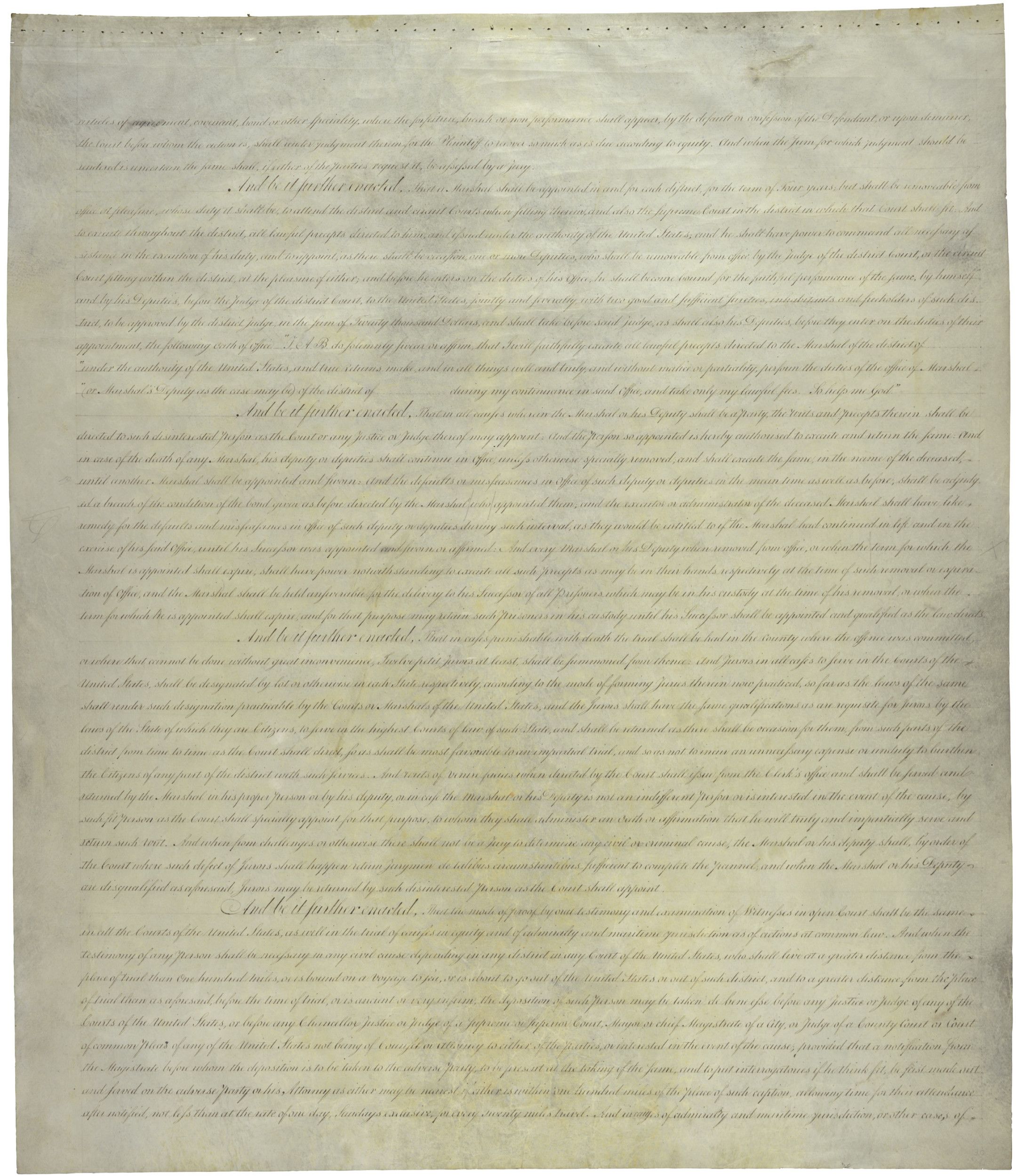
Judiciary Act of 1789
Page 6
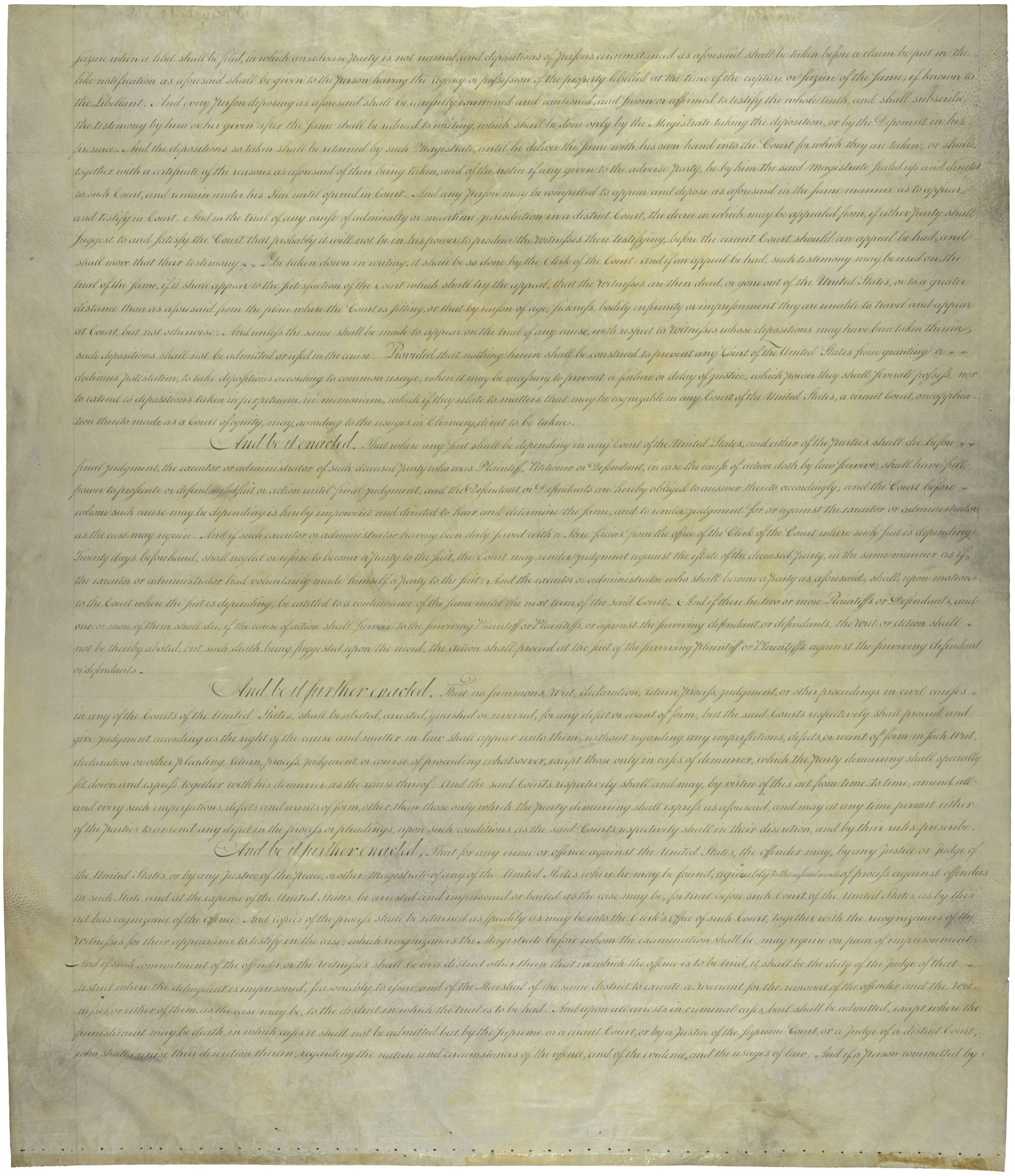
Judiciary Act of 1789
Page 7
